:max_bytes(150000):strip_icc():format(webp)/audio-books-56a324b93df78cf7727c00f5.jpg)
New Silencing Unwanted Noise in Your iMovie Projects on macOS Systems

Silencing Unwanted Noise in Your iMovie Projects on macOS Systems
A well-edited video gains everyone’s attention with its stunning visuals and acoustics. An important factor that counts in designing such a video is the absence of noise. Any sound or voice in the background that disrupts content integrity is noise. However, you can remove background noises in iMovie, a specified software for Mac.
The focus of this article will be on reducing background noise in iMovie in detail. Readers will also acquire knowledge of alternative tools with similar functionalities. There will be a brief introduction to reducing background noise in iMovie and other tools. Feel free to read about these tools and determine which aligns with your demands.
AI Audio Editor A cross-platform for facilitating your video editing process by offering valuable benefits!
Free Download Free Download Learn More
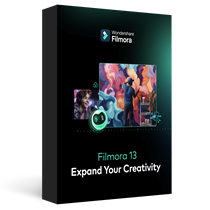
Part 1: Some Basic Recording-Level Considerations One Should Make to Avoid Noise in Videos
The advancements in AI technology have made noise reduction seamless. Although, there are some pre-recording measures one can take to minimize noise. This section on reducing background noise in iMovie will mention those measures. The following primary considerations can make a big difference in terms of noise:
1. Pick the Right Location
If you are recording an audio or video, the first step is to choose the right surroundings. Although no location can be completely noise-free, one can try. Places with less population and more nature are noise-free as usual. Book a studio for video or audio recording, as you don’t need much effort. They offer pre-arranged setups and space, which also includes noise-canceling equipment.
2. Microphone Quality and Position
For professional-grade audio and video creation, the microphone is a necessity. A high-quality microphone is proficient in providing high-quality sound. There are two microphone options: an external microphone or a device-integrated microphone. Moreover, the position and settings of microphones determine the clarity of voice. If the microphone is set closer to the speaker, it will deliver a decent speech sound.
3. Wind Protection and Interference
The noise of wind is an obstacle for everyone who prefers outdoor shoots. It not only declines audio clarity but annoys the viewers. To reduce wind noise, use a windscreen or furry cover. To avoid other types of interference, keep the recorder away from electrical devices. This may include smartphones, laptops, and similar devices.
4. Audio and Gain Levels
While recording, it is important to keep track of audio levels for improvement. Creators can use headphones to detect audio levels and maintain unwanted noises. In addition, we advise you to set the gain at an appropriate level for clarity. A high gain value can decline audio quality through noise and other distortions.
5. Right Formats and Editing
Before you start recording, make sure to choose a high-quality audio format. The popular and widely used high-quality formats are WAV and FLAC. Moreover, choose the right editing software that has noise reduction ability. The software should also retain audio quality during and after editing. These tools also offer audio enhancement effects that can do the trick.
Part 2: Basic Solution to Background Noise Removal for Mac Users: iMovie
iMovie is a built-in application designed for macOS devices for creating and editing. Mac users can employ this software to edit their movies by introducing music effects. In iMovie, users can share their projects online or streamline them on Apple TV. With its video and audio editing abilities, you can reduce background noise iMovie.
The software offers audio enhancement for speech clarity and audio equalizer. With its audio denoise function, reducing background noise in iMovie is seamless. The feature rests on its main editing interface and is easy to utilize. In addition, it can multiple audio formats are editable in it, like ACC, MP3, and more.
Steps to Reduce Background Noise in iMovie
Are you a Mac user and want to learn about removing background noise in iMovie? Use this perfect step-by-step guide to gain knowledge about noise reduction:
Step 1
Initiate iMovie, press the “Create New” button and import media. Then, use the drag-and-drop technique to bring your media to the timeline.
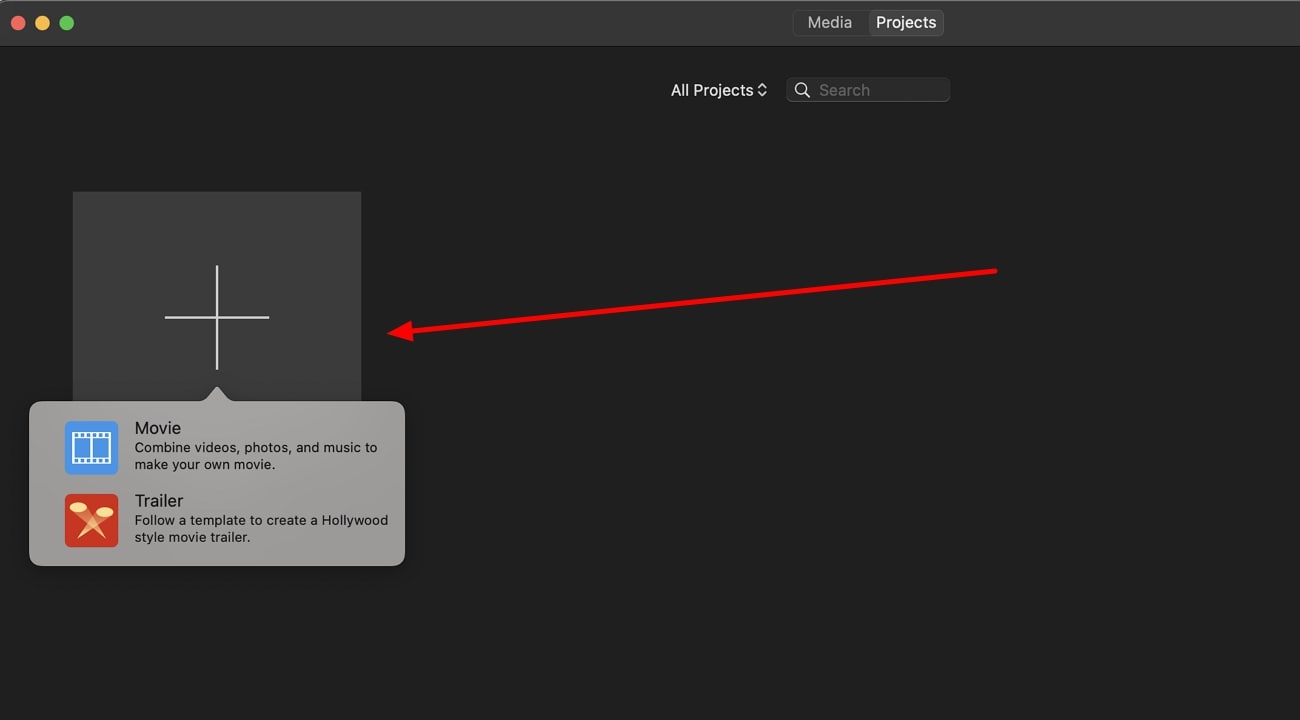
Step 2
Navigate towards the toolbar at the top right and explore options. Locate and click the “Noise Reduction and Equalizer” button to start editing.
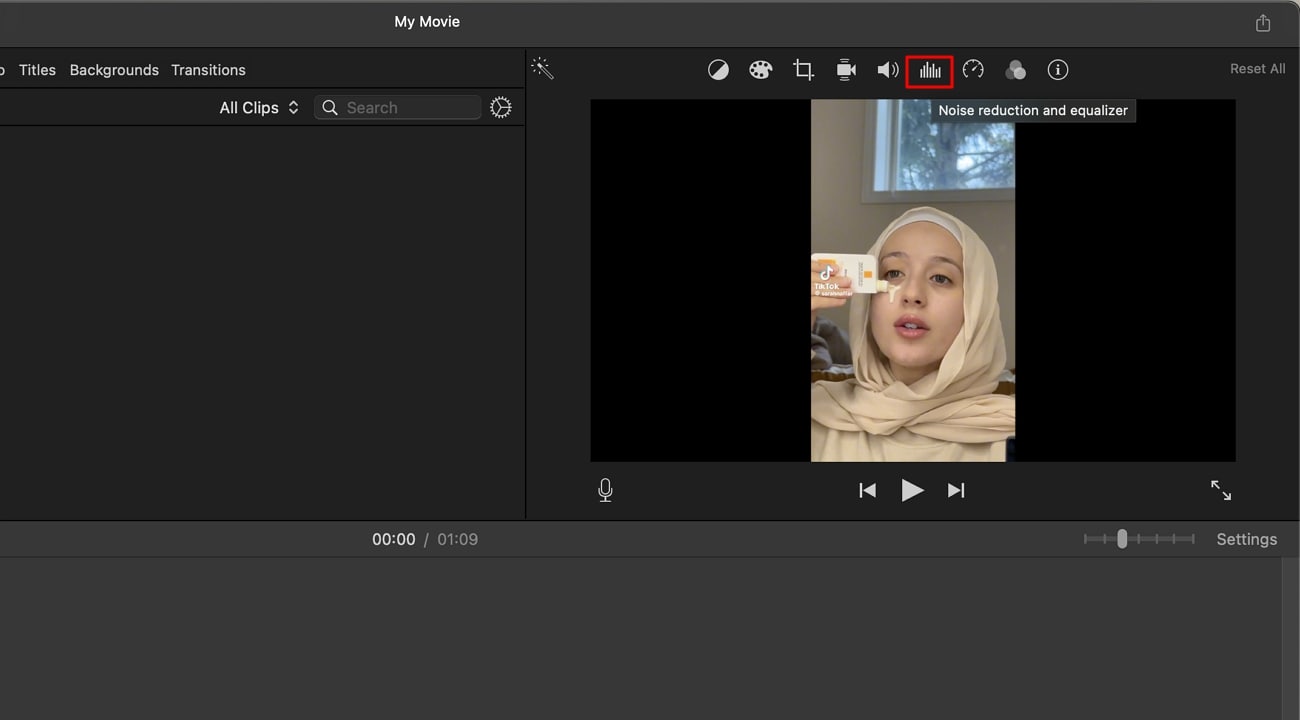
Step 3
From the given options, access the “Reduce background noise” slider. Change the position of this slider to adjust the percentage of noise reduction.
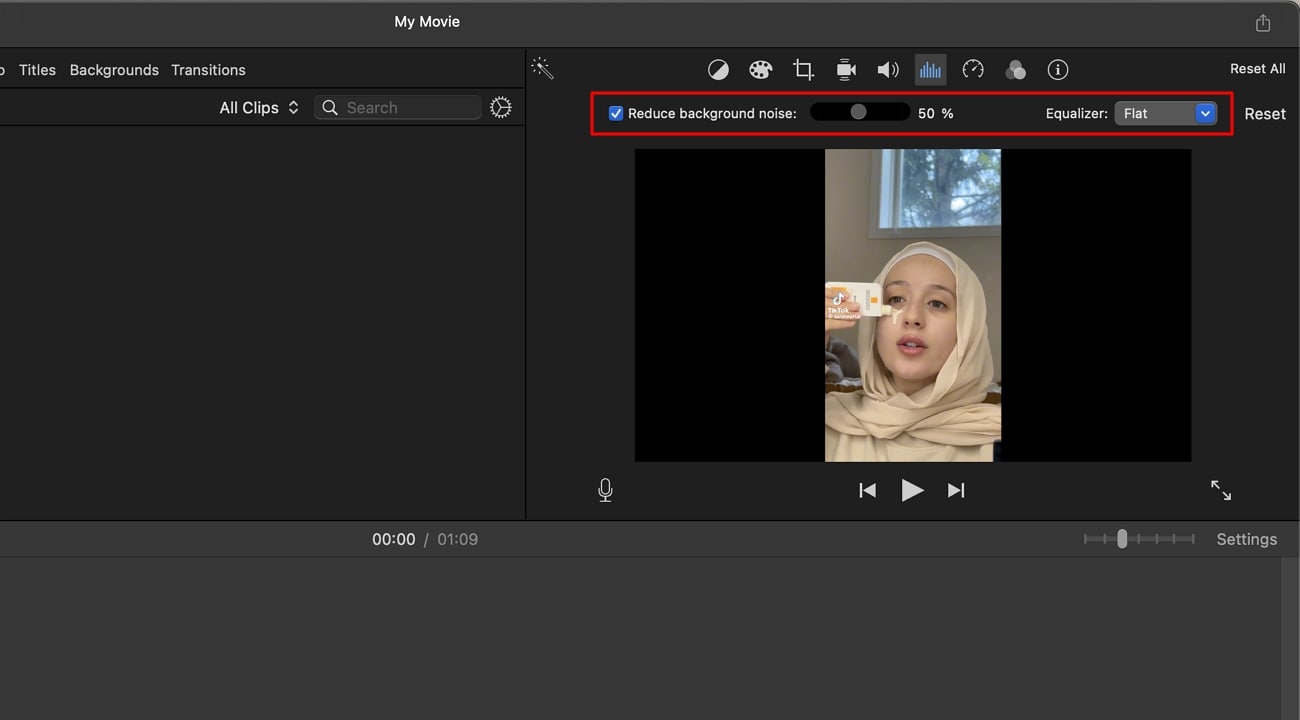
Step 4
Now, play your video to see the results and adjust the intensity of the noise. Once you are satisfied with the results, export your video or save it to iMovie.
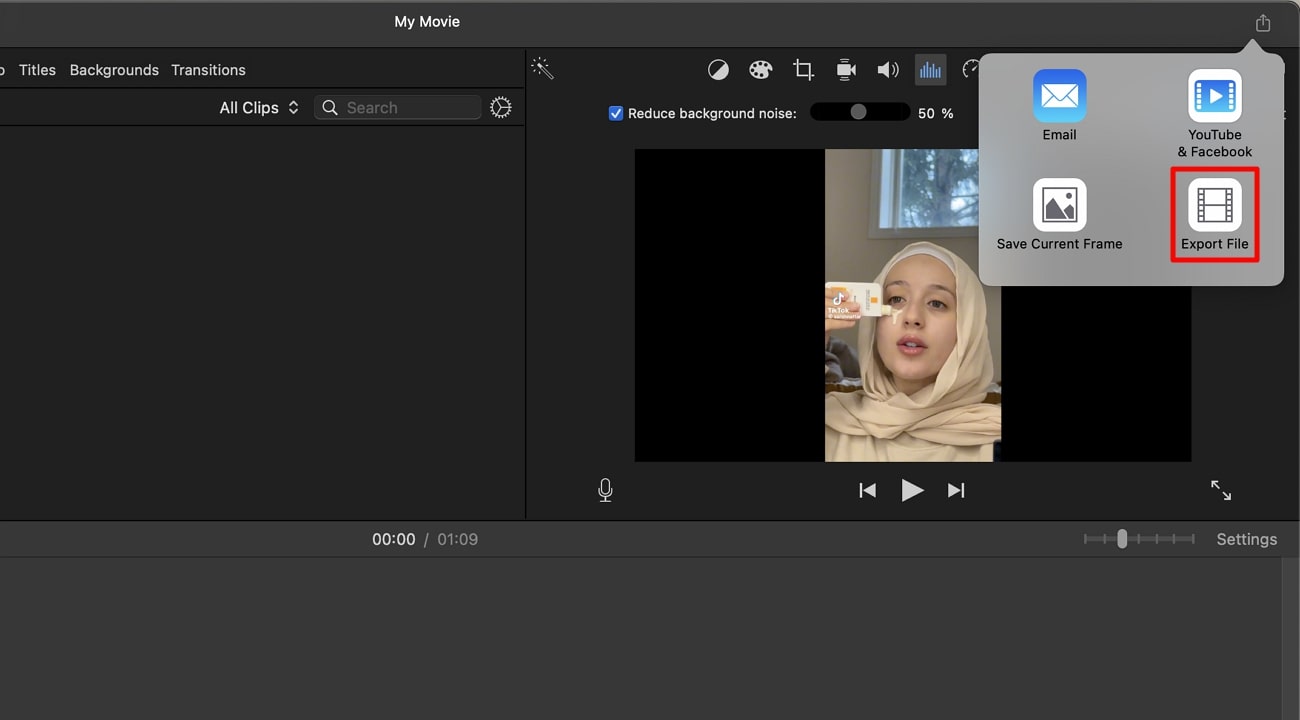
Part 3: Some Other Top-Notch Facilities for Background Noise Removal on Mac
While the iMovie remove background noise function is your first option, a backup never hurts. In this section, the focus will be on some desktop alternatives of iMovie. Users will gain knowledge of some premium video editing tools for this purpose. Keep reading to learn more about this software for efficient and productive editing:
1. Wondershare UniConverter
On top of our list of iMovie remove background noise alternatives is UniConverter. The software assists in 6 different types of background noise removal. Users can remove static, echo, humming, wind noise, chatting, and hissing. The software supports the majority of audio formats like MP3, WAV, and more. You can level up your bad audio quality in three simple steps.
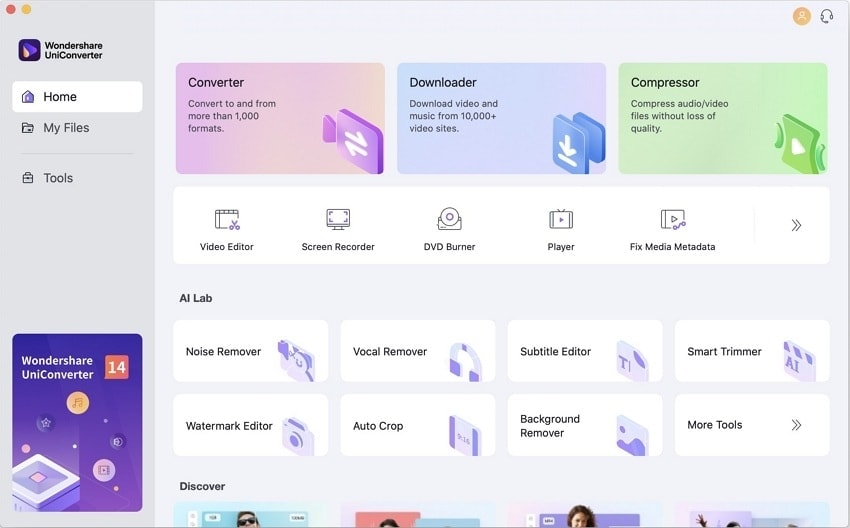
Pros
- The software supports batch processing to remove noise for productive editing.
- Along with noise reduction, users can employ its vocal remover for speech clarity.
Cons
- It is not able to assist in some advanced editing techniques.
2. Krisp
This is a desktop software that clarifies your voice during video calls. It enhances voice using three techniques including background voice, noise, and echo. Whether it’s an animal’s voice in the background or a human chatting. It is an AI-driven software that detects background voices and removes them accurately.
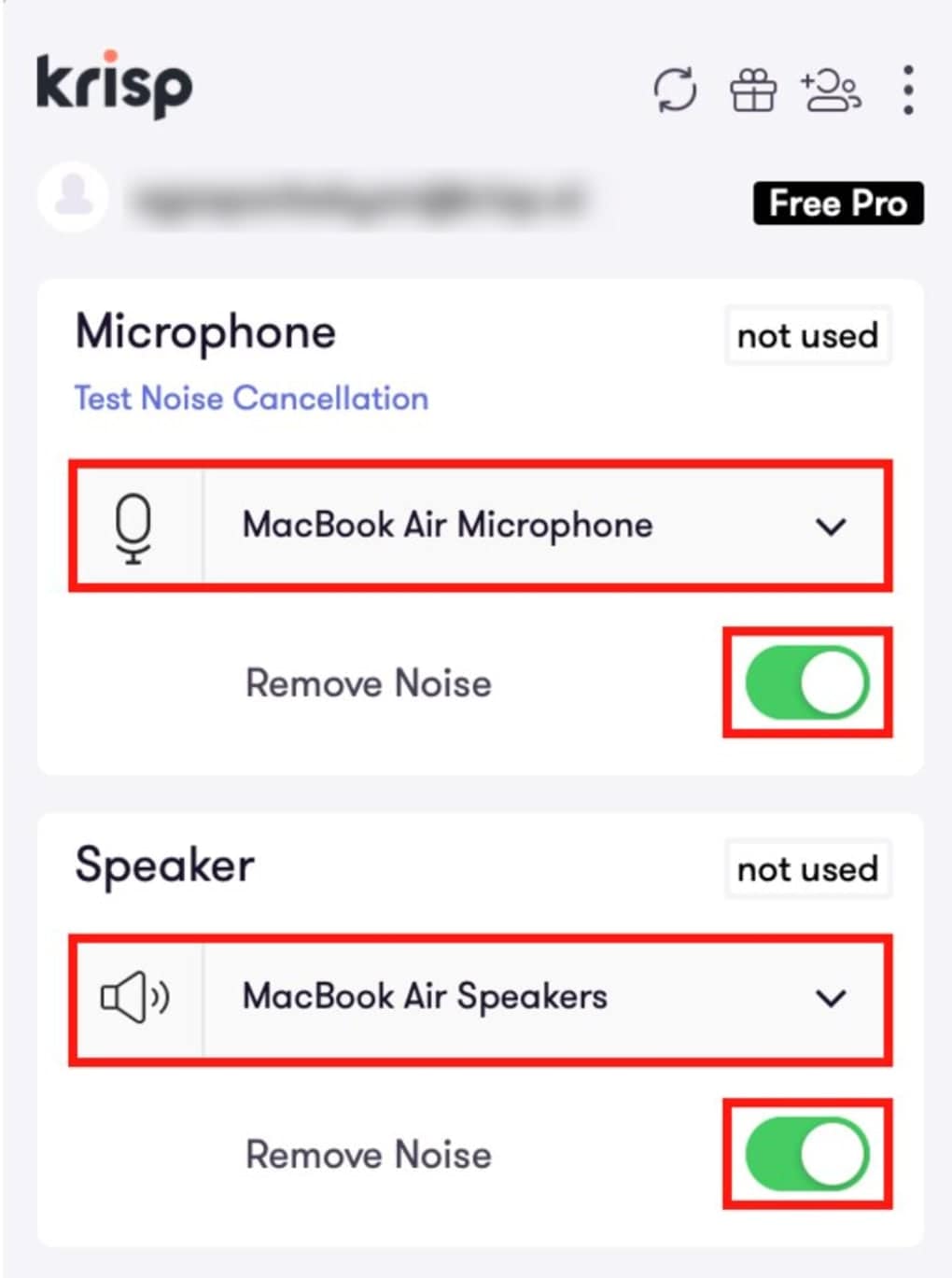
Pros
- Its AI meeting assistant can transcribe your videos, and you don’t need to worry about taking notes.
- It collaborates with all your platforms to enhance the quality of your content.
Cons
- While enhancing audio in it, your voice can start to sound robotic.
3. Adobe Audition
Adobe Audition is another reduce background noise iMovie alternative. It assists in audio denoise with its custom noise reduction options and effects. The tool falls into professional software categories that help with audio and video editing. In addition, users can adjust the level of frequency to high, low, and medium. It operates on sliders to adjust the value of noise elements in a video.
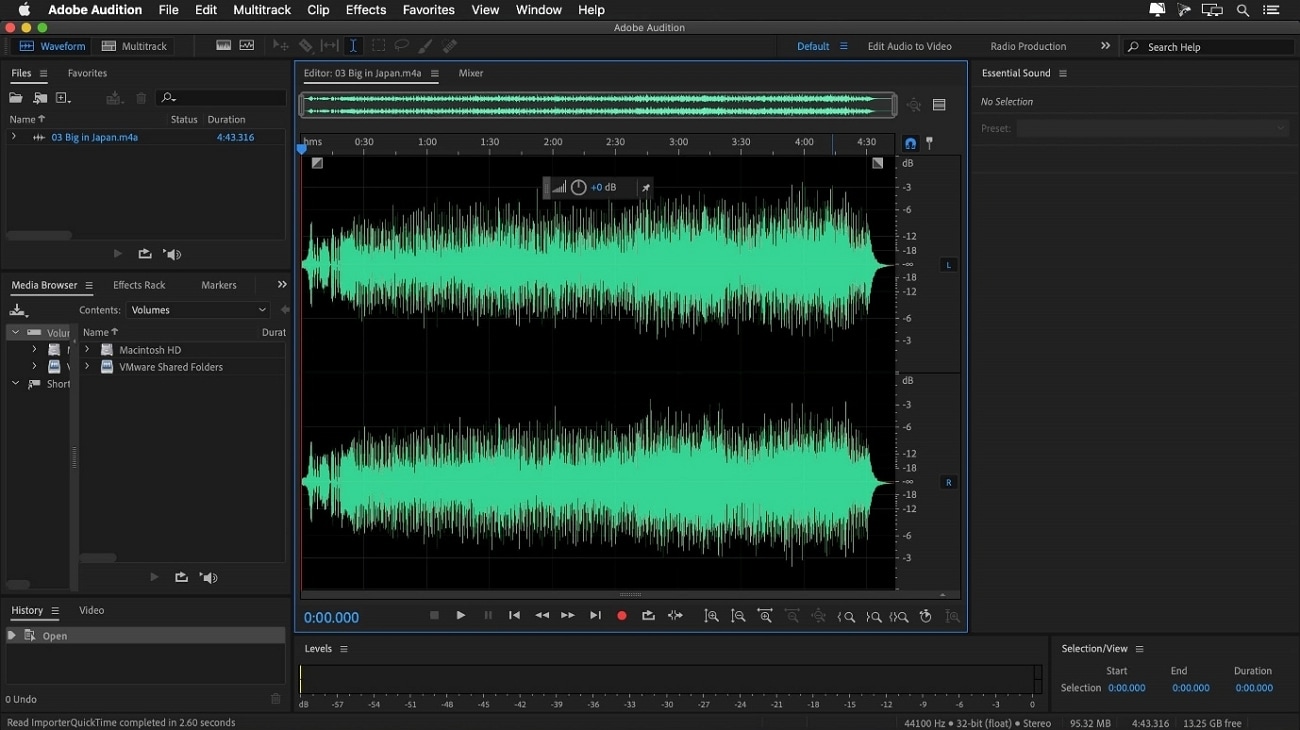
Pros
- It has pre-assembled sound effects that are completely free to use.
- To avoid background noises prior to editing, you can record voiceovers and podcasts in it.
Cons
- The user interface might be too technical for those with basic-level editing skills.
4. HitPaw Video Converter
HitPaw Video Converter is a versatile platform assisting in video, audio, and photo editing tasks. The software employs AI assistance to bring clarity to your audio projects. With this iMovie background noise reduction alternative, noise removal is a few clicks away. Users just need to upload their video or audio, and it will elevate their quality. Moreover, it supports multiple audio and video formats to diversify your options.
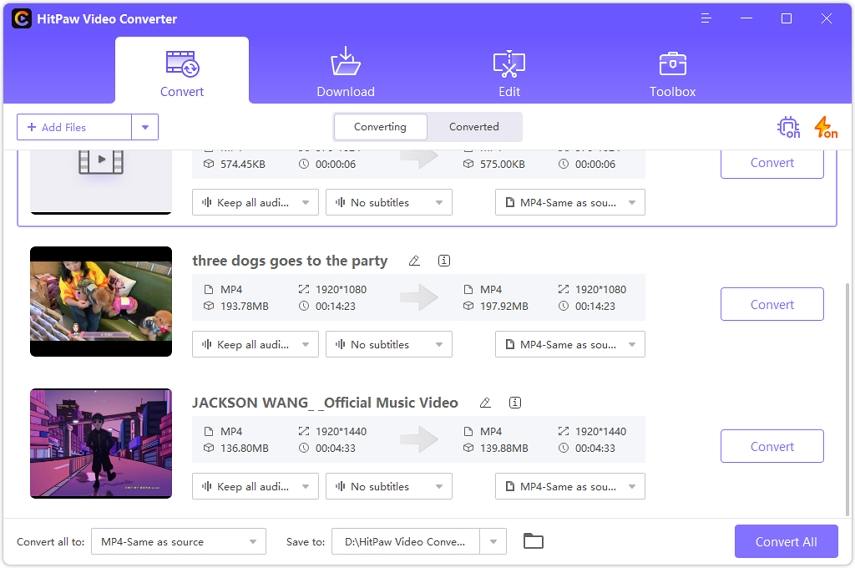
Pros
- The interface of this iMovie background noise reduction alternative is straightforward.
- With its AI photo and video enhancer, you can uplift their visual and overall quality.
Cons
- The customer care of HitPaw takes a while to respond, which is a turn-off for users.
Bonus Part: A Comprehensive Solution for Vocal Removal: Wondershare Filmora
Whilst reducing background noise in iMovie is operational, its alternatives exist. In addition to noise control, users can also manage vocals. To perform this in an efficient way, none other than Wondershare Filmora can assist. It is a professional and updated video editing software with multi-functionalities. Editors can employ its AI Vocal Remover feature to edit vocals and export them.
The method of accessing this tool is straightforward and requires a few steps. This function separates vocals from background voices, which are further editable. You can simply delete the background noise track and export the video with vocals only. Moreover, its timeline editing feature brings precision to projects.
Free Download For Win 7 or later(64-bit)
Free Download For macOS 10.14 or later
Exclusive Sound Editing Features of Wondershare Filmora
Wondershare Filmora brings its users an extensive range of audio and video editing features. There is so much one can do with their hands on this software. This section of the article will discuss other audio-relative features of Filmora:
1. AI Audio Denoise
There are multiple forms of background noises and techniques to remove them. Filmora’s denoise features provide multiple techniques for denoising. Users can employ its audio enhancement feature to improve speech. Moreover, it has wind removal, hiss, and hum removing options. You can also employ its reverb reduction to minimize echo in your content.
2. Silence Detection
One of the many ways of uplifting your content’s audio is to remove the silent pauses. Locating and eliminating silent parts of video is difficult by yourself. This AI auto-detects and eliminates the silent parts of videos with precision. It will optimize your videos for the audience, as the pauses may irritate them.
3. Audio Ducking
Being a content creator can be challenging in terms of precise editing. In Filmora, you do not need to adjust the audio elements of each track separately. With its audio ducking feature, users can fade one audio track to clarify the other. It auto-detects the speech parts of videos and decreases the music levels in them.
4. Auto Beat Sync
If you wish to align your video footage with an external audio track, this is the best option. Filmora’s audio beat sync streamlines your content with its functionality. Its Auto Montage Maker synchronizes content and adds effects according to beat points. Moreover, it can auto-enhance your content by fixing the overexposed or dark portions.
Using AI Vocal Remover in Wondershare Filmora
After familiarizing yourself with a few of Filmora’s functionalities, let’s discuss further. This section of our article will guide you about accessing vocal remover. Follow the guide mentioned below to remove vocals from your video:
Step 1Initiate a New Project to Import Media
Once you download this software on your device, start it and access its main display. Continue to create a new project by clicking on the “New Project” button. Upon accessing the editing interface, use the “Command + I” keys to import media.
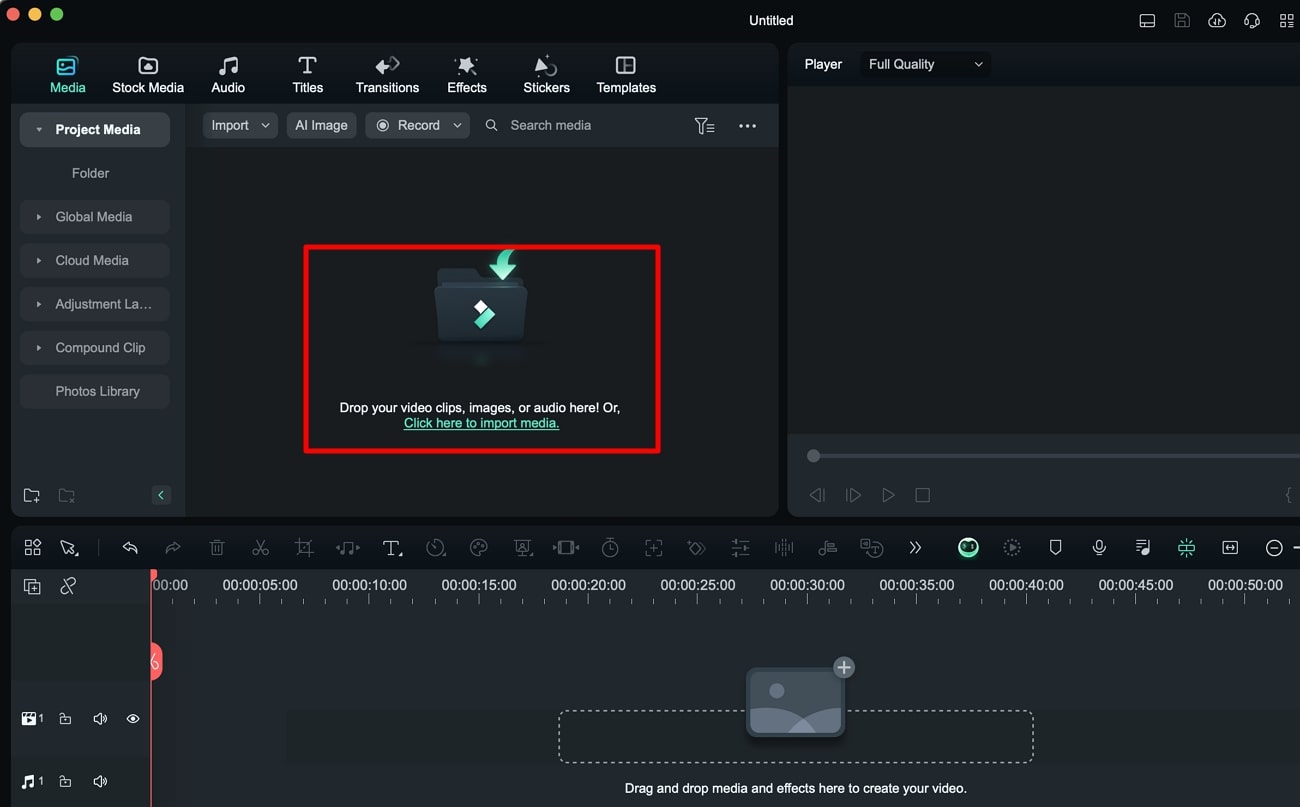
Step 2Start Vocal Remover
Now, bring the imported media to the timeline, select it, and navigate towards the top toolbar. From there, access the “Tools” option and choose the “Audio” option. From the audio expansion panel, choose the “AI Vocal Remover” option. The vocal removal progress will appear on the screen.
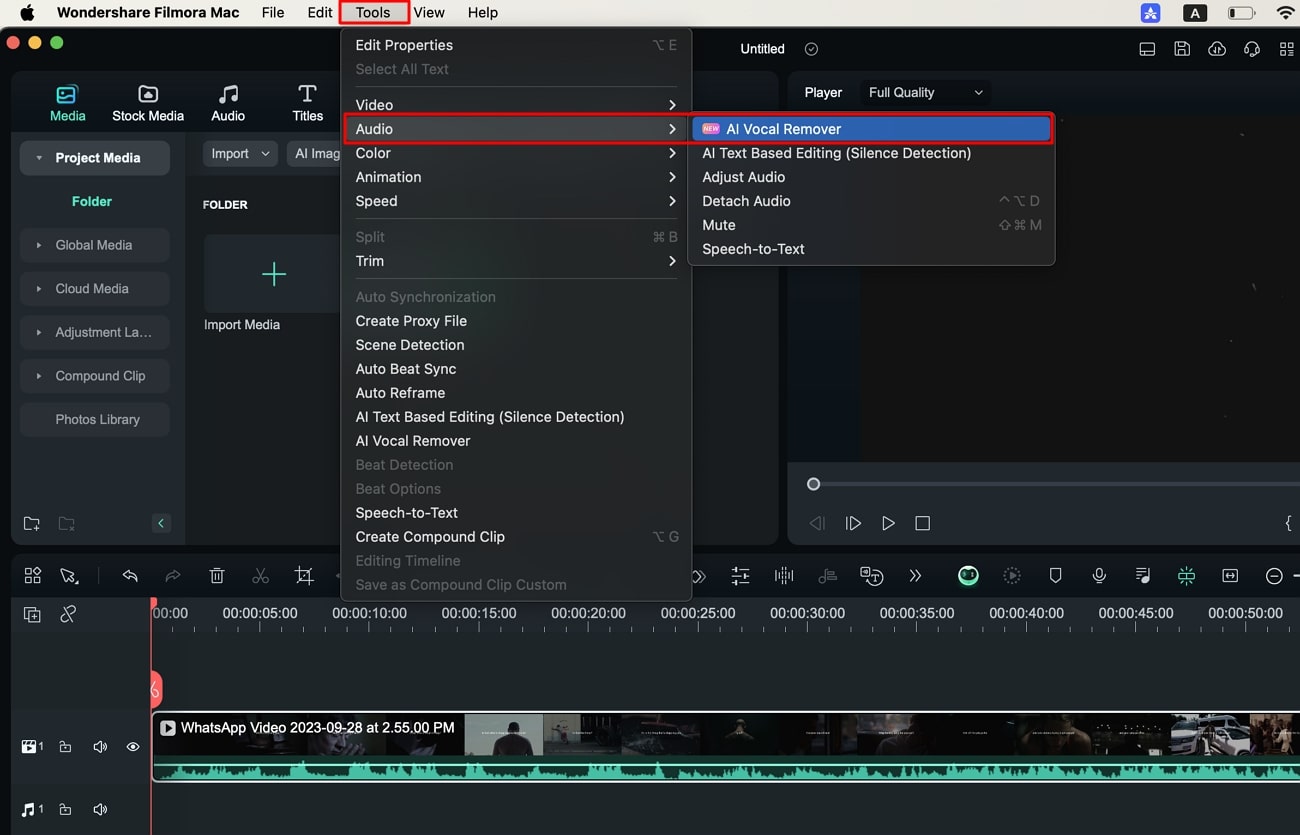
Step 3Set Preferences and Export Media
Once the vocals have been separated from background noise, make customizations. After this, delete the background noise and navigate towards the top right corner. From there, click the “Export” button and download your video on your device.
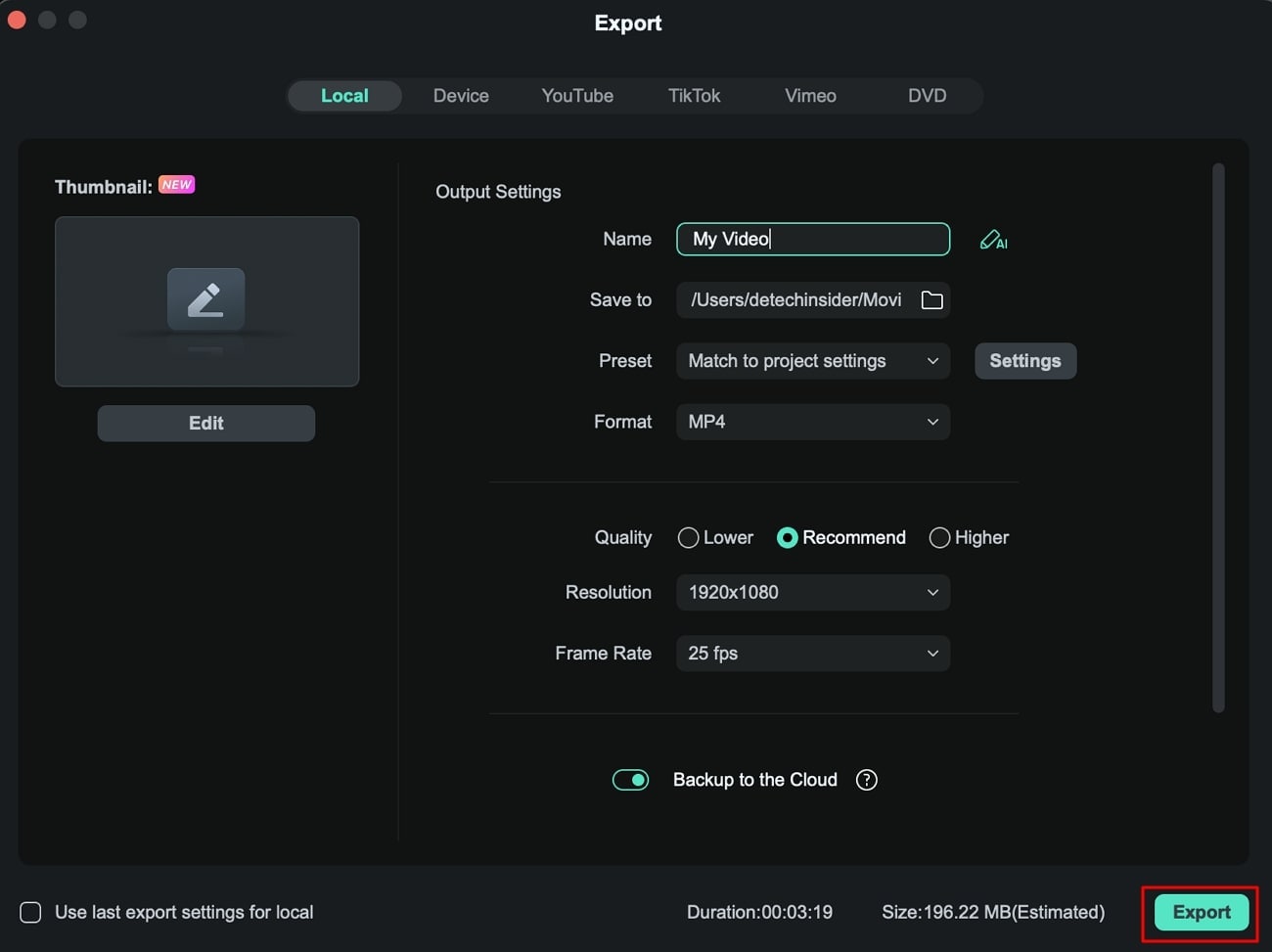
Free Download For Win 7 or later(64-bit)
Free Download For macOS 10.14 or later
Conclusion
In this article, the focus of attention remained on removing background noises in iMovie. Users also learned about some of its alternatives to use when it’s not working. In addition, the article sheds on a most reliable alternative named Wondershare Filmora.
It assists as a multifunctional tool with audio denoise and vocal remover features. Both are worthy of enhancing audio by removing or separating background noises. If you are in search of a background noise remover, this is your tool.
Free Download Free Download Learn More

Part 1: Some Basic Recording-Level Considerations One Should Make to Avoid Noise in Videos
The advancements in AI technology have made noise reduction seamless. Although, there are some pre-recording measures one can take to minimize noise. This section on reducing background noise in iMovie will mention those measures. The following primary considerations can make a big difference in terms of noise:
1. Pick the Right Location
If you are recording an audio or video, the first step is to choose the right surroundings. Although no location can be completely noise-free, one can try. Places with less population and more nature are noise-free as usual. Book a studio for video or audio recording, as you don’t need much effort. They offer pre-arranged setups and space, which also includes noise-canceling equipment.
2. Microphone Quality and Position
For professional-grade audio and video creation, the microphone is a necessity. A high-quality microphone is proficient in providing high-quality sound. There are two microphone options: an external microphone or a device-integrated microphone. Moreover, the position and settings of microphones determine the clarity of voice. If the microphone is set closer to the speaker, it will deliver a decent speech sound.
3. Wind Protection and Interference
The noise of wind is an obstacle for everyone who prefers outdoor shoots. It not only declines audio clarity but annoys the viewers. To reduce wind noise, use a windscreen or furry cover. To avoid other types of interference, keep the recorder away from electrical devices. This may include smartphones, laptops, and similar devices.
4. Audio and Gain Levels
While recording, it is important to keep track of audio levels for improvement. Creators can use headphones to detect audio levels and maintain unwanted noises. In addition, we advise you to set the gain at an appropriate level for clarity. A high gain value can decline audio quality through noise and other distortions.
5. Right Formats and Editing
Before you start recording, make sure to choose a high-quality audio format. The popular and widely used high-quality formats are WAV and FLAC. Moreover, choose the right editing software that has noise reduction ability. The software should also retain audio quality during and after editing. These tools also offer audio enhancement effects that can do the trick.
Part 2: Basic Solution to Background Noise Removal for Mac Users: iMovie
iMovie is a built-in application designed for macOS devices for creating and editing. Mac users can employ this software to edit their movies by introducing music effects. In iMovie, users can share their projects online or streamline them on Apple TV. With its video and audio editing abilities, you can reduce background noise iMovie.
The software offers audio enhancement for speech clarity and audio equalizer. With its audio denoise function, reducing background noise in iMovie is seamless. The feature rests on its main editing interface and is easy to utilize. In addition, it can multiple audio formats are editable in it, like ACC, MP3, and more.
Steps to Reduce Background Noise in iMovie
Are you a Mac user and want to learn about removing background noise in iMovie? Use this perfect step-by-step guide to gain knowledge about noise reduction:
Step 1
Initiate iMovie, press the “Create New” button and import media. Then, use the drag-and-drop technique to bring your media to the timeline.

Step 2
Navigate towards the toolbar at the top right and explore options. Locate and click the “Noise Reduction and Equalizer” button to start editing.

Step 3
From the given options, access the “Reduce background noise” slider. Change the position of this slider to adjust the percentage of noise reduction.

Step 4
Now, play your video to see the results and adjust the intensity of the noise. Once you are satisfied with the results, export your video or save it to iMovie.

Part 3: Some Other Top-Notch Facilities for Background Noise Removal on Mac
While the iMovie remove background noise function is your first option, a backup never hurts. In this section, the focus will be on some desktop alternatives of iMovie. Users will gain knowledge of some premium video editing tools for this purpose. Keep reading to learn more about this software for efficient and productive editing:
1. Wondershare UniConverter
On top of our list of iMovie remove background noise alternatives is UniConverter. The software assists in 6 different types of background noise removal. Users can remove static, echo, humming, wind noise, chatting, and hissing. The software supports the majority of audio formats like MP3, WAV, and more. You can level up your bad audio quality in three simple steps.

Pros
- The software supports batch processing to remove noise for productive editing.
- Along with noise reduction, users can employ its vocal remover for speech clarity.
Cons
- It is not able to assist in some advanced editing techniques.
2. Krisp
This is a desktop software that clarifies your voice during video calls. It enhances voice using three techniques including background voice, noise, and echo. Whether it’s an animal’s voice in the background or a human chatting. It is an AI-driven software that detects background voices and removes them accurately.

Pros
- Its AI meeting assistant can transcribe your videos, and you don’t need to worry about taking notes.
- It collaborates with all your platforms to enhance the quality of your content.
Cons
- While enhancing audio in it, your voice can start to sound robotic.
3. Adobe Audition
Adobe Audition is another reduce background noise iMovie alternative. It assists in audio denoise with its custom noise reduction options and effects. The tool falls into professional software categories that help with audio and video editing. In addition, users can adjust the level of frequency to high, low, and medium. It operates on sliders to adjust the value of noise elements in a video.

Pros
- It has pre-assembled sound effects that are completely free to use.
- To avoid background noises prior to editing, you can record voiceovers and podcasts in it.
Cons
- The user interface might be too technical for those with basic-level editing skills.
4. HitPaw Video Converter
HitPaw Video Converter is a versatile platform assisting in video, audio, and photo editing tasks. The software employs AI assistance to bring clarity to your audio projects. With this iMovie background noise reduction alternative, noise removal is a few clicks away. Users just need to upload their video or audio, and it will elevate their quality. Moreover, it supports multiple audio and video formats to diversify your options.

Pros
- The interface of this iMovie background noise reduction alternative is straightforward.
- With its AI photo and video enhancer, you can uplift their visual and overall quality.
Cons
- The customer care of HitPaw takes a while to respond, which is a turn-off for users.
Bonus Part: A Comprehensive Solution for Vocal Removal: Wondershare Filmora
Whilst reducing background noise in iMovie is operational, its alternatives exist. In addition to noise control, users can also manage vocals. To perform this in an efficient way, none other than Wondershare Filmora can assist. It is a professional and updated video editing software with multi-functionalities. Editors can employ its AI Vocal Remover feature to edit vocals and export them.
The method of accessing this tool is straightforward and requires a few steps. This function separates vocals from background voices, which are further editable. You can simply delete the background noise track and export the video with vocals only. Moreover, its timeline editing feature brings precision to projects.
Free Download For Win 7 or later(64-bit)
Free Download For macOS 10.14 or later
Exclusive Sound Editing Features of Wondershare Filmora
Wondershare Filmora brings its users an extensive range of audio and video editing features. There is so much one can do with their hands on this software. This section of the article will discuss other audio-relative features of Filmora:
1. AI Audio Denoise
There are multiple forms of background noises and techniques to remove them. Filmora’s denoise features provide multiple techniques for denoising. Users can employ its audio enhancement feature to improve speech. Moreover, it has wind removal, hiss, and hum removing options. You can also employ its reverb reduction to minimize echo in your content.
2. Silence Detection
One of the many ways of uplifting your content’s audio is to remove the silent pauses. Locating and eliminating silent parts of video is difficult by yourself. This AI auto-detects and eliminates the silent parts of videos with precision. It will optimize your videos for the audience, as the pauses may irritate them.
3. Audio Ducking
Being a content creator can be challenging in terms of precise editing. In Filmora, you do not need to adjust the audio elements of each track separately. With its audio ducking feature, users can fade one audio track to clarify the other. It auto-detects the speech parts of videos and decreases the music levels in them.
4. Auto Beat Sync
If you wish to align your video footage with an external audio track, this is the best option. Filmora’s audio beat sync streamlines your content with its functionality. Its Auto Montage Maker synchronizes content and adds effects according to beat points. Moreover, it can auto-enhance your content by fixing the overexposed or dark portions.
Using AI Vocal Remover in Wondershare Filmora
After familiarizing yourself with a few of Filmora’s functionalities, let’s discuss further. This section of our article will guide you about accessing vocal remover. Follow the guide mentioned below to remove vocals from your video:
Step 1Initiate a New Project to Import Media
Once you download this software on your device, start it and access its main display. Continue to create a new project by clicking on the “New Project” button. Upon accessing the editing interface, use the “Command + I” keys to import media.

Step 2Start Vocal Remover
Now, bring the imported media to the timeline, select it, and navigate towards the top toolbar. From there, access the “Tools” option and choose the “Audio” option. From the audio expansion panel, choose the “AI Vocal Remover” option. The vocal removal progress will appear on the screen.

Step 3Set Preferences and Export Media
Once the vocals have been separated from background noise, make customizations. After this, delete the background noise and navigate towards the top right corner. From there, click the “Export” button and download your video on your device.

Free Download For Win 7 or later(64-bit)
Free Download For macOS 10.14 or later
Conclusion
In this article, the focus of attention remained on removing background noises in iMovie. Users also learned about some of its alternatives to use when it’s not working. In addition, the article sheds on a most reliable alternative named Wondershare Filmora.
It assists as a multifunctional tool with audio denoise and vocal remover features. Both are worthy of enhancing audio by removing or separating background noises. If you are in search of a background noise remover, this is your tool.
Outstanding Digital Audio Workstation Alternatives to Audacity
Record Audio and Edit
Wondershare Filmora is one of the best video editors that features both audio recording and audio editing features. Download and have a free trial.
Undoubtedly, Audacity is a good audio editing software , but people are moving towards Audacity alternative softwares because there are many bugs. Recently, the privacy policy of Audacity has changed and it is stated that it will collect the data of the users for law enforcement, authorities, and litigation which is making people switch from it.
If you are looking for the best alternatives to A udacity audio software, you have visited the right source. Here you will get detailed information on the audio software competing with Audacity. Their features, pricing, and supported system have also been mentioned that provide you with more details.
In this article
01 Top 10 Best Alternatives to Audacity
02 How to Choose Audacity Alternatives
Part 1: 10 Best Alternatives to Audacity for Mac/Windows/Linux Computers
Several audacity alternative software are now available in the market that provide you the same features as Audacity or more. So, here is the list of ten tools that compete with Audacity:
1. Ocenaudio
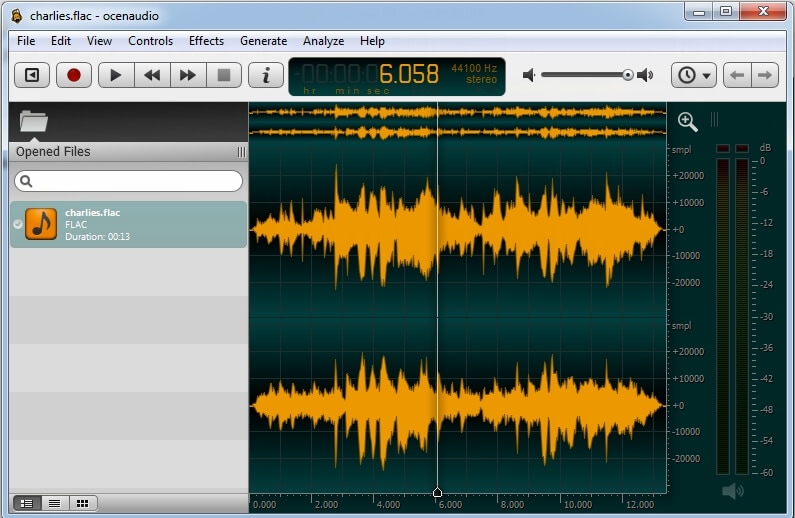
Ocenaudio is a functional audio editor that is very easy to use and understand. You can use it for editing and analyzing your audio files without any issue, delay or complications. This software has many powerful features for advanced users, such as real-time preview of effects, fully-featured spectrogram, multi-section for delicate editions, etc.
The framework of this A udacity alternative for Mac is based on Ocen Framework. Ocenaudio is always responsive no matter how many files you have opened; its processing will never be slow. You can open the time-consuming tasks in the background so that you can work on other audio files.
Supported Systems: Mac OS X, Linux, and Microsoft Windows
Pricing: Free Download
2. Wavosaur
Wavosaur is a audio editing software that offers you the features of batch convert, edit audio, produce music loops, record, and analyze. It also supports ASIO driver, real-time effect processing, multichannel wav files, and VST plug-ins. It allows the facility of batch processing.
An external MIDI controller can be used for triggering the commands of Wavosaur such as fast forward, record, stop play, rewind, go to start, etc. Its major features include frequency analysis, detailed statistics, real-time monitoring, and synthesis features such as frequency sweep, frequency impulse train, etc.
Supported System : Windows
Pricing: Free Download
3. AVS Audio Editor
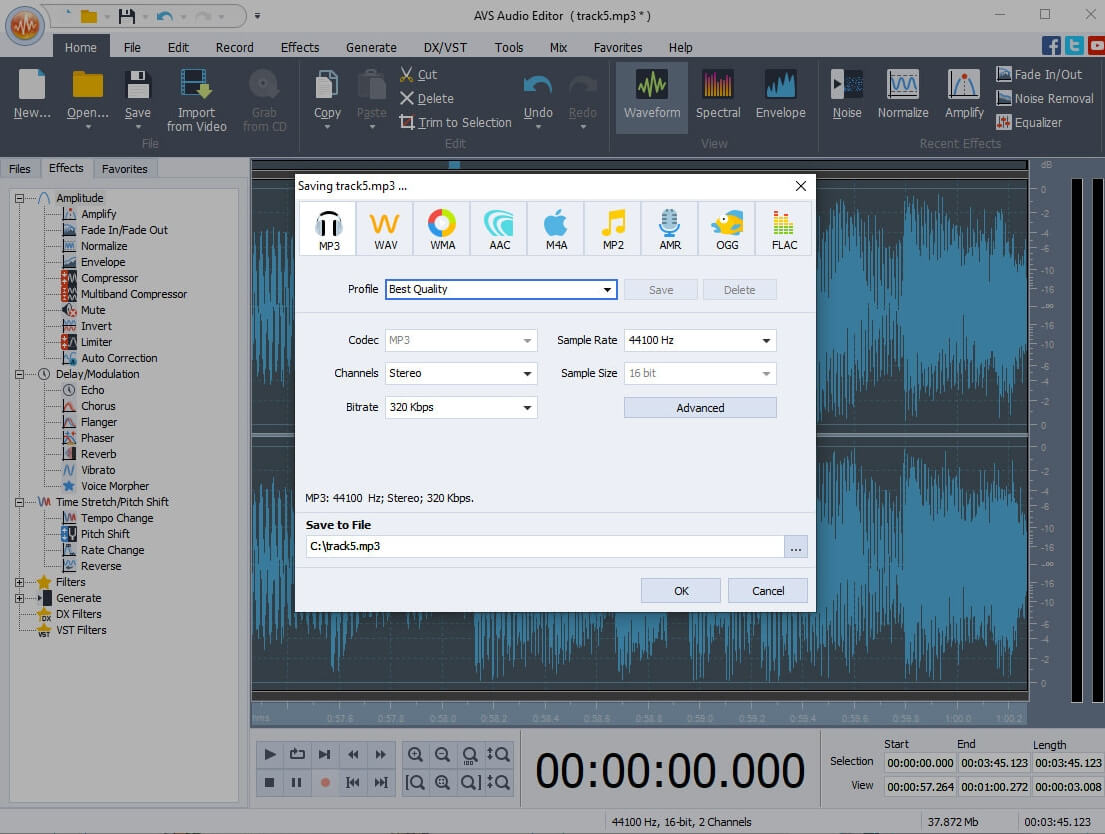
AV Audio Editor is an alternative to Audacity, which is a digital audio editing software offering you the features of effects processing, analyzing, editing, mixing, and recording audio. It provides you with different ways to edit your audio files according to your needs and desires. You can also remove the unwanted noise in the background. This software also allows you to add special effects to your audio file to make it more interesting.
This software is very easy to understand, use and learn. You can use it for editing different types of formats such as OGG, AMR, MP2, MP3, WMA, M4A, WAV, FLAC, etc. You can blend different audio files with each other using this software.
Supported System: Windows
Pricing: A 1-year access subscription costs $17.04, and for an unlimited subscription, it costs $25.78.
4. WavePad
WavePad is one of the best programs like Audacity that fulfills the needs of advanced users related to audio editing. It is a professional software that can also be used for recordings and adding different effects such as noise reduction, amplification, echo, etc. It supports various file formats such as OGG, FLAC, AIF, AU, WMA, GSM, VOX, real audio, etc.
You can also use this software for non-commercial purposes. Virtual Studio Technology and DirectX technology have been used in this software that offers you several effects and tools. Its advanced tools include voice changer, speech synthesis, and spectral analysis.
Supported System: Windows and Mac.
Pricing: $3.88/month
5. Adobe Audition CC
Adobe Audition CC offers you remarkable features to clean up audio, implement effects, restore poor quality and mix different audio sources together. This software is best for music sampling, sound design, and podcasting. You can remove unwanted sound from the audio file if you want to.
This software offers you enhanced recording performance and improved playback quality of audio. You can also remove background noise using it. Plus, it allows you to adjust the amplitude and the loudness scale in real-time. All you need to do is use your mouse and edit the audio just as you like.
Supported System : Mac OS and Windows
Pricing: $31.49 per month per user.
6. Ardour
Ardour is one of the best programs like Audacity that provide remarkable editing features to the users to edit the audio professionally. You can record audio using this software and can also edit in different ways. It consists of an excellent and attractive audio interface. All you need to do is plug in your keyboard, mouse, and a microphone to record and edit your audio file.
You can cut, stretch, delete, trim, align, paste, snapshot, drag, swing, drop, etc., to the audio file you want to edit. This tool is best for musicians as it provides creative ways to edit the audio file. It offers a natural and fast environment to create and edit soundtracks.
Supported System: Windows, Mac OS, and Linux
Pricing: $1, $4, $10 or $50 for monthly subscription depending on requirements.
7. FL Studio
FL Studio is an alternative to Audacity that is considered the best in the market, especially for EDM music creators. It is the most used software by the artists such as Porter Robinson, Martin Garrix, etc., for the purpose of editing audio files.
This software supports all the features expected by a music editor. Its standard features include audio effects, time-stretching, multi-track editing, etc. Its additional feature includes “Step Mode,” which allows the editors to create patterns and do sequencing in just a few seconds. Its “Note Mode” allows the users to add harmony and melodies to the audio file.
Supported System: Mac OS, Windows
Pricing: Free trial, License starts at $99, packages depend upon requirements
8. AudioDope
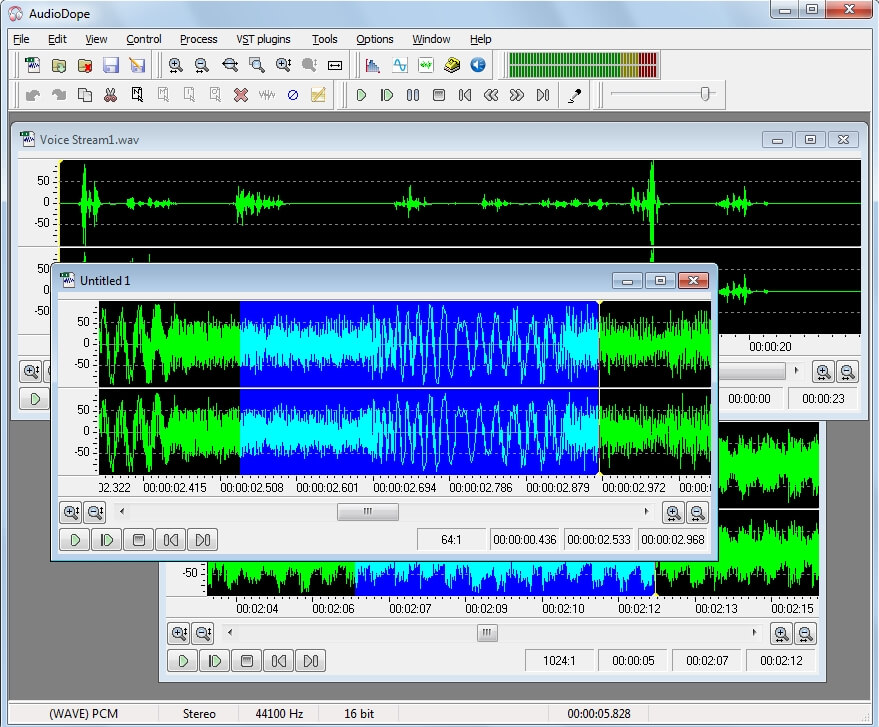
AudioDope is enriched with audio-related features and is an alternative to Audacity. You can edit all your audio files or some parts of these files using this software. You can also edit these files separately by adding different sound effects to enhance your audio files. It consists of filters like band-pass, low-pass, high-pass, etc.
It also consists of some built-in tools, for example, tone generator and frequency analyzer. Moreover, this software also supports VST plug-ins. It allows you to create ringtones according to your desires from the audio files you have saved in your system.
Supported System: Windows OS
Pricing: Free
9. AVID Pro Tools
AVID Pro Tools is an audio editing software like Audacity that allows you to edit your audio file precisely. It enables you to organize different soundtracks into folders that are collapsible to provide you the ease of controlling extensive sessions. The drag-and-drop gestures are also available that allow you to arrange, route, and consolidate tracks.
Its features like professional compressors, top-notch stompboxes, EQs, robust reverbs, and virtual instruments provide you with flexibility for editing your audio file. It is a creative tool based on advanced technology that is best for audio professionals, musicians, and artists. You can also fuel your creativity with pro-plug-ins.
Supported System: Mac OS, Windows
Pricing: Free, $299 for a one-year subscription
10. Ableton Live
Ableton Live is a popular software like Audacity used for audio editing purposes. It fulfills your need to edit your audio file effectively and efficiently using unique and remarkable features. This software is specially designed for live use that comes with a snappier and clean user interface. It is very easy to use and understand as it is customizable.
This software also consists of a solid library of instruments, kits, loops, and sounds that allow you to create innovative and unique music according to your desires. There are about fifty sound effects that can be added to your audio file. It also consists of quick mapping that allows you to use Ableton Live with controllers and keyboards.
Supported System: Windows, Mac OS
Pricing: Live 11 Intro in $99, Live 11 Standard for $449, Live 11 Suite for $749
Part 2: What to Look for in an Audacity Alternatives?
You need to look to the following factors for picking up the alternatives to Audacity:
1. Features
You should check the features of the software you are choosing as the alternative to Audacity. Make sure it consists of all the features required to edit your audio file, such as recording, cropping, removing background noise, etc.
2. Pricing
You should also check the pricing details of the alternative before moving towards it. You should check whether the price is according to the features it provides or not. Moreover, you should also check the other options available for free are giving quality features or not.
3. Supported Platforms
You should select an alternative to Audacity depending upon the system you are using, such as Windows, Mac, or Linux.
Conclusion
Today, people prefer the audacity alternative tools due to the change in the privacy policy of Audacity. Luckily, there are multiple alternatives available in the market that can compete with Audacity and allow you to edit your audio file in a better environment.
The best audio editing software for Mac users is Adobe Audition, as it provides advanced features to edit an audio file. The best alternative based on the easy-to-use feature is Ocenaudio, as its interface and features are very easy to understand. And the best alternative for professionals is WavePad.
Undoubtedly, Audacity is a good audio editing software , but people are moving towards Audacity alternative softwares because there are many bugs. Recently, the privacy policy of Audacity has changed and it is stated that it will collect the data of the users for law enforcement, authorities, and litigation which is making people switch from it.
If you are looking for the best alternatives to A udacity audio software, you have visited the right source. Here you will get detailed information on the audio software competing with Audacity. Their features, pricing, and supported system have also been mentioned that provide you with more details.
In this article
01 Top 10 Best Alternatives to Audacity
02 How to Choose Audacity Alternatives
Part 1: 10 Best Alternatives to Audacity for Mac/Windows/Linux Computers
Several audacity alternative software are now available in the market that provide you the same features as Audacity or more. So, here is the list of ten tools that compete with Audacity:
1. Ocenaudio

Ocenaudio is a functional audio editor that is very easy to use and understand. You can use it for editing and analyzing your audio files without any issue, delay or complications. This software has many powerful features for advanced users, such as real-time preview of effects, fully-featured spectrogram, multi-section for delicate editions, etc.
The framework of this A udacity alternative for Mac is based on Ocen Framework. Ocenaudio is always responsive no matter how many files you have opened; its processing will never be slow. You can open the time-consuming tasks in the background so that you can work on other audio files.
Supported Systems: Mac OS X, Linux, and Microsoft Windows
Pricing: Free Download
2. Wavosaur
Wavosaur is a audio editing software that offers you the features of batch convert, edit audio, produce music loops, record, and analyze. It also supports ASIO driver, real-time effect processing, multichannel wav files, and VST plug-ins. It allows the facility of batch processing.
An external MIDI controller can be used for triggering the commands of Wavosaur such as fast forward, record, stop play, rewind, go to start, etc. Its major features include frequency analysis, detailed statistics, real-time monitoring, and synthesis features such as frequency sweep, frequency impulse train, etc.
Supported System : Windows
Pricing: Free Download
3. AVS Audio Editor

AV Audio Editor is an alternative to Audacity, which is a digital audio editing software offering you the features of effects processing, analyzing, editing, mixing, and recording audio. It provides you with different ways to edit your audio files according to your needs and desires. You can also remove the unwanted noise in the background. This software also allows you to add special effects to your audio file to make it more interesting.
This software is very easy to understand, use and learn. You can use it for editing different types of formats such as OGG, AMR, MP2, MP3, WMA, M4A, WAV, FLAC, etc. You can blend different audio files with each other using this software.
Supported System: Windows
Pricing: A 1-year access subscription costs $17.04, and for an unlimited subscription, it costs $25.78.
4. WavePad
WavePad is one of the best programs like Audacity that fulfills the needs of advanced users related to audio editing. It is a professional software that can also be used for recordings and adding different effects such as noise reduction, amplification, echo, etc. It supports various file formats such as OGG, FLAC, AIF, AU, WMA, GSM, VOX, real audio, etc.
You can also use this software for non-commercial purposes. Virtual Studio Technology and DirectX technology have been used in this software that offers you several effects and tools. Its advanced tools include voice changer, speech synthesis, and spectral analysis.
Supported System: Windows and Mac.
Pricing: $3.88/month
5. Adobe Audition CC
Adobe Audition CC offers you remarkable features to clean up audio, implement effects, restore poor quality and mix different audio sources together. This software is best for music sampling, sound design, and podcasting. You can remove unwanted sound from the audio file if you want to.
This software offers you enhanced recording performance and improved playback quality of audio. You can also remove background noise using it. Plus, it allows you to adjust the amplitude and the loudness scale in real-time. All you need to do is use your mouse and edit the audio just as you like.
Supported System : Mac OS and Windows
Pricing: $31.49 per month per user.
6. Ardour
Ardour is one of the best programs like Audacity that provide remarkable editing features to the users to edit the audio professionally. You can record audio using this software and can also edit in different ways. It consists of an excellent and attractive audio interface. All you need to do is plug in your keyboard, mouse, and a microphone to record and edit your audio file.
You can cut, stretch, delete, trim, align, paste, snapshot, drag, swing, drop, etc., to the audio file you want to edit. This tool is best for musicians as it provides creative ways to edit the audio file. It offers a natural and fast environment to create and edit soundtracks.
Supported System: Windows, Mac OS, and Linux
Pricing: $1, $4, $10 or $50 for monthly subscription depending on requirements.
7. FL Studio
FL Studio is an alternative to Audacity that is considered the best in the market, especially for EDM music creators. It is the most used software by the artists such as Porter Robinson, Martin Garrix, etc., for the purpose of editing audio files.
This software supports all the features expected by a music editor. Its standard features include audio effects, time-stretching, multi-track editing, etc. Its additional feature includes “Step Mode,” which allows the editors to create patterns and do sequencing in just a few seconds. Its “Note Mode” allows the users to add harmony and melodies to the audio file.
Supported System: Mac OS, Windows
Pricing: Free trial, License starts at $99, packages depend upon requirements
8. AudioDope

AudioDope is enriched with audio-related features and is an alternative to Audacity. You can edit all your audio files or some parts of these files using this software. You can also edit these files separately by adding different sound effects to enhance your audio files. It consists of filters like band-pass, low-pass, high-pass, etc.
It also consists of some built-in tools, for example, tone generator and frequency analyzer. Moreover, this software also supports VST plug-ins. It allows you to create ringtones according to your desires from the audio files you have saved in your system.
Supported System: Windows OS
Pricing: Free
9. AVID Pro Tools
AVID Pro Tools is an audio editing software like Audacity that allows you to edit your audio file precisely. It enables you to organize different soundtracks into folders that are collapsible to provide you the ease of controlling extensive sessions. The drag-and-drop gestures are also available that allow you to arrange, route, and consolidate tracks.
Its features like professional compressors, top-notch stompboxes, EQs, robust reverbs, and virtual instruments provide you with flexibility for editing your audio file. It is a creative tool based on advanced technology that is best for audio professionals, musicians, and artists. You can also fuel your creativity with pro-plug-ins.
Supported System: Mac OS, Windows
Pricing: Free, $299 for a one-year subscription
10. Ableton Live
Ableton Live is a popular software like Audacity used for audio editing purposes. It fulfills your need to edit your audio file effectively and efficiently using unique and remarkable features. This software is specially designed for live use that comes with a snappier and clean user interface. It is very easy to use and understand as it is customizable.
This software also consists of a solid library of instruments, kits, loops, and sounds that allow you to create innovative and unique music according to your desires. There are about fifty sound effects that can be added to your audio file. It also consists of quick mapping that allows you to use Ableton Live with controllers and keyboards.
Supported System: Windows, Mac OS
Pricing: Live 11 Intro in $99, Live 11 Standard for $449, Live 11 Suite for $749
Part 2: What to Look for in an Audacity Alternatives?
You need to look to the following factors for picking up the alternatives to Audacity:
1. Features
You should check the features of the software you are choosing as the alternative to Audacity. Make sure it consists of all the features required to edit your audio file, such as recording, cropping, removing background noise, etc.
2. Pricing
You should also check the pricing details of the alternative before moving towards it. You should check whether the price is according to the features it provides or not. Moreover, you should also check the other options available for free are giving quality features or not.
3. Supported Platforms
You should select an alternative to Audacity depending upon the system you are using, such as Windows, Mac, or Linux.
Conclusion
Today, people prefer the audacity alternative tools due to the change in the privacy policy of Audacity. Luckily, there are multiple alternatives available in the market that can compete with Audacity and allow you to edit your audio file in a better environment.
The best audio editing software for Mac users is Adobe Audition, as it provides advanced features to edit an audio file. The best alternative based on the easy-to-use feature is Ocenaudio, as its interface and features are very easy to understand. And the best alternative for professionals is WavePad.
Undoubtedly, Audacity is a good audio editing software , but people are moving towards Audacity alternative softwares because there are many bugs. Recently, the privacy policy of Audacity has changed and it is stated that it will collect the data of the users for law enforcement, authorities, and litigation which is making people switch from it.
If you are looking for the best alternatives to A udacity audio software, you have visited the right source. Here you will get detailed information on the audio software competing with Audacity. Their features, pricing, and supported system have also been mentioned that provide you with more details.
In this article
01 Top 10 Best Alternatives to Audacity
02 How to Choose Audacity Alternatives
Part 1: 10 Best Alternatives to Audacity for Mac/Windows/Linux Computers
Several audacity alternative software are now available in the market that provide you the same features as Audacity or more. So, here is the list of ten tools that compete with Audacity:
1. Ocenaudio

Ocenaudio is a functional audio editor that is very easy to use and understand. You can use it for editing and analyzing your audio files without any issue, delay or complications. This software has many powerful features for advanced users, such as real-time preview of effects, fully-featured spectrogram, multi-section for delicate editions, etc.
The framework of this A udacity alternative for Mac is based on Ocen Framework. Ocenaudio is always responsive no matter how many files you have opened; its processing will never be slow. You can open the time-consuming tasks in the background so that you can work on other audio files.
Supported Systems: Mac OS X, Linux, and Microsoft Windows
Pricing: Free Download
2. Wavosaur
Wavosaur is a audio editing software that offers you the features of batch convert, edit audio, produce music loops, record, and analyze. It also supports ASIO driver, real-time effect processing, multichannel wav files, and VST plug-ins. It allows the facility of batch processing.
An external MIDI controller can be used for triggering the commands of Wavosaur such as fast forward, record, stop play, rewind, go to start, etc. Its major features include frequency analysis, detailed statistics, real-time monitoring, and synthesis features such as frequency sweep, frequency impulse train, etc.
Supported System : Windows
Pricing: Free Download
3. AVS Audio Editor

AV Audio Editor is an alternative to Audacity, which is a digital audio editing software offering you the features of effects processing, analyzing, editing, mixing, and recording audio. It provides you with different ways to edit your audio files according to your needs and desires. You can also remove the unwanted noise in the background. This software also allows you to add special effects to your audio file to make it more interesting.
This software is very easy to understand, use and learn. You can use it for editing different types of formats such as OGG, AMR, MP2, MP3, WMA, M4A, WAV, FLAC, etc. You can blend different audio files with each other using this software.
Supported System: Windows
Pricing: A 1-year access subscription costs $17.04, and for an unlimited subscription, it costs $25.78.
4. WavePad
WavePad is one of the best programs like Audacity that fulfills the needs of advanced users related to audio editing. It is a professional software that can also be used for recordings and adding different effects such as noise reduction, amplification, echo, etc. It supports various file formats such as OGG, FLAC, AIF, AU, WMA, GSM, VOX, real audio, etc.
You can also use this software for non-commercial purposes. Virtual Studio Technology and DirectX technology have been used in this software that offers you several effects and tools. Its advanced tools include voice changer, speech synthesis, and spectral analysis.
Supported System: Windows and Mac.
Pricing: $3.88/month
5. Adobe Audition CC
Adobe Audition CC offers you remarkable features to clean up audio, implement effects, restore poor quality and mix different audio sources together. This software is best for music sampling, sound design, and podcasting. You can remove unwanted sound from the audio file if you want to.
This software offers you enhanced recording performance and improved playback quality of audio. You can also remove background noise using it. Plus, it allows you to adjust the amplitude and the loudness scale in real-time. All you need to do is use your mouse and edit the audio just as you like.
Supported System : Mac OS and Windows
Pricing: $31.49 per month per user.
6. Ardour
Ardour is one of the best programs like Audacity that provide remarkable editing features to the users to edit the audio professionally. You can record audio using this software and can also edit in different ways. It consists of an excellent and attractive audio interface. All you need to do is plug in your keyboard, mouse, and a microphone to record and edit your audio file.
You can cut, stretch, delete, trim, align, paste, snapshot, drag, swing, drop, etc., to the audio file you want to edit. This tool is best for musicians as it provides creative ways to edit the audio file. It offers a natural and fast environment to create and edit soundtracks.
Supported System: Windows, Mac OS, and Linux
Pricing: $1, $4, $10 or $50 for monthly subscription depending on requirements.
7. FL Studio
FL Studio is an alternative to Audacity that is considered the best in the market, especially for EDM music creators. It is the most used software by the artists such as Porter Robinson, Martin Garrix, etc., for the purpose of editing audio files.
This software supports all the features expected by a music editor. Its standard features include audio effects, time-stretching, multi-track editing, etc. Its additional feature includes “Step Mode,” which allows the editors to create patterns and do sequencing in just a few seconds. Its “Note Mode” allows the users to add harmony and melodies to the audio file.
Supported System: Mac OS, Windows
Pricing: Free trial, License starts at $99, packages depend upon requirements
8. AudioDope

AudioDope is enriched with audio-related features and is an alternative to Audacity. You can edit all your audio files or some parts of these files using this software. You can also edit these files separately by adding different sound effects to enhance your audio files. It consists of filters like band-pass, low-pass, high-pass, etc.
It also consists of some built-in tools, for example, tone generator and frequency analyzer. Moreover, this software also supports VST plug-ins. It allows you to create ringtones according to your desires from the audio files you have saved in your system.
Supported System: Windows OS
Pricing: Free
9. AVID Pro Tools
AVID Pro Tools is an audio editing software like Audacity that allows you to edit your audio file precisely. It enables you to organize different soundtracks into folders that are collapsible to provide you the ease of controlling extensive sessions. The drag-and-drop gestures are also available that allow you to arrange, route, and consolidate tracks.
Its features like professional compressors, top-notch stompboxes, EQs, robust reverbs, and virtual instruments provide you with flexibility for editing your audio file. It is a creative tool based on advanced technology that is best for audio professionals, musicians, and artists. You can also fuel your creativity with pro-plug-ins.
Supported System: Mac OS, Windows
Pricing: Free, $299 for a one-year subscription
10. Ableton Live
Ableton Live is a popular software like Audacity used for audio editing purposes. It fulfills your need to edit your audio file effectively and efficiently using unique and remarkable features. This software is specially designed for live use that comes with a snappier and clean user interface. It is very easy to use and understand as it is customizable.
This software also consists of a solid library of instruments, kits, loops, and sounds that allow you to create innovative and unique music according to your desires. There are about fifty sound effects that can be added to your audio file. It also consists of quick mapping that allows you to use Ableton Live with controllers and keyboards.
Supported System: Windows, Mac OS
Pricing: Live 11 Intro in $99, Live 11 Standard for $449, Live 11 Suite for $749
Part 2: What to Look for in an Audacity Alternatives?
You need to look to the following factors for picking up the alternatives to Audacity:
1. Features
You should check the features of the software you are choosing as the alternative to Audacity. Make sure it consists of all the features required to edit your audio file, such as recording, cropping, removing background noise, etc.
2. Pricing
You should also check the pricing details of the alternative before moving towards it. You should check whether the price is according to the features it provides or not. Moreover, you should also check the other options available for free are giving quality features or not.
3. Supported Platforms
You should select an alternative to Audacity depending upon the system you are using, such as Windows, Mac, or Linux.
Conclusion
Today, people prefer the audacity alternative tools due to the change in the privacy policy of Audacity. Luckily, there are multiple alternatives available in the market that can compete with Audacity and allow you to edit your audio file in a better environment.
The best audio editing software for Mac users is Adobe Audition, as it provides advanced features to edit an audio file. The best alternative based on the easy-to-use feature is Ocenaudio, as its interface and features are very easy to understand. And the best alternative for professionals is WavePad.
Undoubtedly, Audacity is a good audio editing software , but people are moving towards Audacity alternative softwares because there are many bugs. Recently, the privacy policy of Audacity has changed and it is stated that it will collect the data of the users for law enforcement, authorities, and litigation which is making people switch from it.
If you are looking for the best alternatives to A udacity audio software, you have visited the right source. Here you will get detailed information on the audio software competing with Audacity. Their features, pricing, and supported system have also been mentioned that provide you with more details.
In this article
01 Top 10 Best Alternatives to Audacity
02 How to Choose Audacity Alternatives
Part 1: 10 Best Alternatives to Audacity for Mac/Windows/Linux Computers
Several audacity alternative software are now available in the market that provide you the same features as Audacity or more. So, here is the list of ten tools that compete with Audacity:
1. Ocenaudio

Ocenaudio is a functional audio editor that is very easy to use and understand. You can use it for editing and analyzing your audio files without any issue, delay or complications. This software has many powerful features for advanced users, such as real-time preview of effects, fully-featured spectrogram, multi-section for delicate editions, etc.
The framework of this A udacity alternative for Mac is based on Ocen Framework. Ocenaudio is always responsive no matter how many files you have opened; its processing will never be slow. You can open the time-consuming tasks in the background so that you can work on other audio files.
Supported Systems: Mac OS X, Linux, and Microsoft Windows
Pricing: Free Download
2. Wavosaur
Wavosaur is a audio editing software that offers you the features of batch convert, edit audio, produce music loops, record, and analyze. It also supports ASIO driver, real-time effect processing, multichannel wav files, and VST plug-ins. It allows the facility of batch processing.
An external MIDI controller can be used for triggering the commands of Wavosaur such as fast forward, record, stop play, rewind, go to start, etc. Its major features include frequency analysis, detailed statistics, real-time monitoring, and synthesis features such as frequency sweep, frequency impulse train, etc.
Supported System : Windows
Pricing: Free Download
3. AVS Audio Editor

AV Audio Editor is an alternative to Audacity, which is a digital audio editing software offering you the features of effects processing, analyzing, editing, mixing, and recording audio. It provides you with different ways to edit your audio files according to your needs and desires. You can also remove the unwanted noise in the background. This software also allows you to add special effects to your audio file to make it more interesting.
This software is very easy to understand, use and learn. You can use it for editing different types of formats such as OGG, AMR, MP2, MP3, WMA, M4A, WAV, FLAC, etc. You can blend different audio files with each other using this software.
Supported System: Windows
Pricing: A 1-year access subscription costs $17.04, and for an unlimited subscription, it costs $25.78.
4. WavePad
WavePad is one of the best programs like Audacity that fulfills the needs of advanced users related to audio editing. It is a professional software that can also be used for recordings and adding different effects such as noise reduction, amplification, echo, etc. It supports various file formats such as OGG, FLAC, AIF, AU, WMA, GSM, VOX, real audio, etc.
You can also use this software for non-commercial purposes. Virtual Studio Technology and DirectX technology have been used in this software that offers you several effects and tools. Its advanced tools include voice changer, speech synthesis, and spectral analysis.
Supported System: Windows and Mac.
Pricing: $3.88/month
5. Adobe Audition CC
Adobe Audition CC offers you remarkable features to clean up audio, implement effects, restore poor quality and mix different audio sources together. This software is best for music sampling, sound design, and podcasting. You can remove unwanted sound from the audio file if you want to.
This software offers you enhanced recording performance and improved playback quality of audio. You can also remove background noise using it. Plus, it allows you to adjust the amplitude and the loudness scale in real-time. All you need to do is use your mouse and edit the audio just as you like.
Supported System : Mac OS and Windows
Pricing: $31.49 per month per user.
6. Ardour
Ardour is one of the best programs like Audacity that provide remarkable editing features to the users to edit the audio professionally. You can record audio using this software and can also edit in different ways. It consists of an excellent and attractive audio interface. All you need to do is plug in your keyboard, mouse, and a microphone to record and edit your audio file.
You can cut, stretch, delete, trim, align, paste, snapshot, drag, swing, drop, etc., to the audio file you want to edit. This tool is best for musicians as it provides creative ways to edit the audio file. It offers a natural and fast environment to create and edit soundtracks.
Supported System: Windows, Mac OS, and Linux
Pricing: $1, $4, $10 or $50 for monthly subscription depending on requirements.
7. FL Studio
FL Studio is an alternative to Audacity that is considered the best in the market, especially for EDM music creators. It is the most used software by the artists such as Porter Robinson, Martin Garrix, etc., for the purpose of editing audio files.
This software supports all the features expected by a music editor. Its standard features include audio effects, time-stretching, multi-track editing, etc. Its additional feature includes “Step Mode,” which allows the editors to create patterns and do sequencing in just a few seconds. Its “Note Mode” allows the users to add harmony and melodies to the audio file.
Supported System: Mac OS, Windows
Pricing: Free trial, License starts at $99, packages depend upon requirements
8. AudioDope

AudioDope is enriched with audio-related features and is an alternative to Audacity. You can edit all your audio files or some parts of these files using this software. You can also edit these files separately by adding different sound effects to enhance your audio files. It consists of filters like band-pass, low-pass, high-pass, etc.
It also consists of some built-in tools, for example, tone generator and frequency analyzer. Moreover, this software also supports VST plug-ins. It allows you to create ringtones according to your desires from the audio files you have saved in your system.
Supported System: Windows OS
Pricing: Free
9. AVID Pro Tools
AVID Pro Tools is an audio editing software like Audacity that allows you to edit your audio file precisely. It enables you to organize different soundtracks into folders that are collapsible to provide you the ease of controlling extensive sessions. The drag-and-drop gestures are also available that allow you to arrange, route, and consolidate tracks.
Its features like professional compressors, top-notch stompboxes, EQs, robust reverbs, and virtual instruments provide you with flexibility for editing your audio file. It is a creative tool based on advanced technology that is best for audio professionals, musicians, and artists. You can also fuel your creativity with pro-plug-ins.
Supported System: Mac OS, Windows
Pricing: Free, $299 for a one-year subscription
10. Ableton Live
Ableton Live is a popular software like Audacity used for audio editing purposes. It fulfills your need to edit your audio file effectively and efficiently using unique and remarkable features. This software is specially designed for live use that comes with a snappier and clean user interface. It is very easy to use and understand as it is customizable.
This software also consists of a solid library of instruments, kits, loops, and sounds that allow you to create innovative and unique music according to your desires. There are about fifty sound effects that can be added to your audio file. It also consists of quick mapping that allows you to use Ableton Live with controllers and keyboards.
Supported System: Windows, Mac OS
Pricing: Live 11 Intro in $99, Live 11 Standard for $449, Live 11 Suite for $749
Part 2: What to Look for in an Audacity Alternatives?
You need to look to the following factors for picking up the alternatives to Audacity:
1. Features
You should check the features of the software you are choosing as the alternative to Audacity. Make sure it consists of all the features required to edit your audio file, such as recording, cropping, removing background noise, etc.
2. Pricing
You should also check the pricing details of the alternative before moving towards it. You should check whether the price is according to the features it provides or not. Moreover, you should also check the other options available for free are giving quality features or not.
3. Supported Platforms
You should select an alternative to Audacity depending upon the system you are using, such as Windows, Mac, or Linux.
Conclusion
Today, people prefer the audacity alternative tools due to the change in the privacy policy of Audacity. Luckily, there are multiple alternatives available in the market that can compete with Audacity and allow you to edit your audio file in a better environment.
The best audio editing software for Mac users is Adobe Audition, as it provides advanced features to edit an audio file. The best alternative based on the easy-to-use feature is Ocenaudio, as its interface and features are very easy to understand. And the best alternative for professionals is WavePad.
Innovative Audio Editing: Implementing and Designing Keyframes in Adobe Premiere Pro (Mac)
How to Create Audio Keyframes in Adobe Premiere Pro on Mac

Benjamin Arango
Aug 18, 2022• Proven solutions
Keyframing is one of the most vital components in post-production that can be applied to video and audio tracks. For instance, by adding keyframes in Premiere Pro, you can easily apply properties and values to a specific segment. To do this, you can set up an audio keyframe at the start and another one at the ending of the selected part.
Therefore, with the Premiere Pro keyframe options, you can achieve a gradual flow in your tracks. Without much ado, I’m going to help you set up audio keyframes in Premiere Pro with their vital operations in this post.
Part 1: How to Add Audio Keyframes in Adobe Premiere Pro on Mac?
As I have mentioned, to apply adjustments or properties to a specific point in the audio track, we can use Adobe Premiere keyframes. As of now, there are two kinds of keyframes in Adobe Premiere – Clip Keyframe and Track Keyframe. Before you start adding keyframes in Premiere Pro, you should know their difference.
- Clip Keyframes: This would apply audio effects for the selected clip (like adjusting the volume level). The audio keyframe will only apply to the clip that you have selected and not the entire track.
- Track Keyframes: These audio keyframes in Premiere are applied to the entire audio track (they have values like Volume and Mute).
Now when we have covered the basics, let’s learn how to set up audio keyframes in Premiere on your Mac.
Step 1: Add the Audio Track on Adobe Premiere Pro
To start with, you can launch Adobe Premiere Pro, go to your Project > Import, and simply load any audio track. You can also drag and drop any audio file to the project as well.

Once the audio track is added to the project, you can further drag and drop it to the sequence section (timelines) at the bottom.

Step 2: Show Keyframes for the Track
The application would automatically render different keyframes already present in the track. For this, you need to first select the ribbon of your audio track from the timeline. Now, just right-click on the working area and click on the “Show Audio Keyframes” button from the context menu.

If you want, you can also click on the “Show Keyframes” button that is depicted by a radio/circle icon on the timeline.

Step 3: Work on Audio Keyframes in Premiere Pro
Now, you can view either clip or track keyframes for the track. For this, you can just right-click the keyframe button on the timeline to get different options. Here, you can choose to get Clip or Track keyframes in Premiere Pro. There are options to mute the entire audio or set up its volume under the track option.

Once you have enabled the audio keyframe options in Premiere Pro, you can view keyframes in a highlighted color. You can now take the assistance of the Pen tool or press the CMD key on your Mac to select keyframes. This will let you select the starting and ending keyframes in Premiere Pro so that you can easily apply the desired effect to the selected segment.

Part 2: How to Fade Audio In/Out with Keyframes in Adobe Premiere Pro on Mac?
Once you have learned how to use the Adobe Premiere keyframe feature, you can apply all kinds of transitions and effects to a segment. Let’s suppose you wish to implement fade-in or out features for any segment. In this case, we will use the Clip Keyframing option in Premiere Pro to achieve these transitions the way we like.
Step 1: Get Clip Keyframes in Premiere Pro
Firstly, you can just add any audio track to your Premiere Pro project and drag it to the timeline. You can just click on the show keyframes button to start adding keyframes in Premiere Pro.
If you want, you can just right-click the track, go to the Show Clip Keyframes > Volume > Level option. This will show the level of the volume for different keyframes, letting you pick the right segments to fade in and out.

Step 2: Apply Fade-in or Out options
Once you have clip keyframes in your track, you can easily do whatever you like. You can use the Pen tool or press the CMD key on your Mac to select the starting and the ending of the clip.
Now, go to the audio segment from the timeline and simply place the audio level up (to fade-in) or down (to fade-out). You can set the audio levels for different segments the way you like to customize these operations in your audio track.

Pro Tip: Use Inbuilt Fade In/Out Transitions
With keyframes in Premiere Pro, you can certainly customize the fade in/out options. Though, if you are running short on time, then you can use its inbuilt features for audio adjustments.
For this, you can just go to its Effects > Audio Transitions option. To fade-out any clip, select the Crossfade > Exponential Fade and simply drag and drop to the location of your choice.

In the same way, you can also go to Effects > Audio Transitions > Crossfade and choose the “Constant Gain” feature. You can drag and drop the Contact Gain effect on any segment to implement the fade-in effect.
That’s a wrap, everyone! I’m sure that after reading this post, you would be able to set up audio keyframes in Adobe Premiere Pro. Since adding keyframes in Premiere can be done automatically, it would save your time in audio editing and post-production. Mostly, the clip audio keyframing is used in Adobe to customize the sound at any desired segment. Apart from fade-in or out, there are tons of other effects that you can apply to your audio tracks with the help of keyframes. Go ahead and try the Adobe Premiere Pro keyframing feature and let us know about your experience in the comments.

Benjamin Arango
Benjamin Arango is a writer and a lover of all things video.
Follow @Benjamin Arango
Benjamin Arango
Aug 18, 2022• Proven solutions
Keyframing is one of the most vital components in post-production that can be applied to video and audio tracks. For instance, by adding keyframes in Premiere Pro, you can easily apply properties and values to a specific segment. To do this, you can set up an audio keyframe at the start and another one at the ending of the selected part.
Therefore, with the Premiere Pro keyframe options, you can achieve a gradual flow in your tracks. Without much ado, I’m going to help you set up audio keyframes in Premiere Pro with their vital operations in this post.
Part 1: How to Add Audio Keyframes in Adobe Premiere Pro on Mac?
As I have mentioned, to apply adjustments or properties to a specific point in the audio track, we can use Adobe Premiere keyframes. As of now, there are two kinds of keyframes in Adobe Premiere – Clip Keyframe and Track Keyframe. Before you start adding keyframes in Premiere Pro, you should know their difference.
- Clip Keyframes: This would apply audio effects for the selected clip (like adjusting the volume level). The audio keyframe will only apply to the clip that you have selected and not the entire track.
- Track Keyframes: These audio keyframes in Premiere are applied to the entire audio track (they have values like Volume and Mute).
Now when we have covered the basics, let’s learn how to set up audio keyframes in Premiere on your Mac.
Step 1: Add the Audio Track on Adobe Premiere Pro
To start with, you can launch Adobe Premiere Pro, go to your Project > Import, and simply load any audio track. You can also drag and drop any audio file to the project as well.

Once the audio track is added to the project, you can further drag and drop it to the sequence section (timelines) at the bottom.

Step 2: Show Keyframes for the Track
The application would automatically render different keyframes already present in the track. For this, you need to first select the ribbon of your audio track from the timeline. Now, just right-click on the working area and click on the “Show Audio Keyframes” button from the context menu.

If you want, you can also click on the “Show Keyframes” button that is depicted by a radio/circle icon on the timeline.

Step 3: Work on Audio Keyframes in Premiere Pro
Now, you can view either clip or track keyframes for the track. For this, you can just right-click the keyframe button on the timeline to get different options. Here, you can choose to get Clip or Track keyframes in Premiere Pro. There are options to mute the entire audio or set up its volume under the track option.

Once you have enabled the audio keyframe options in Premiere Pro, you can view keyframes in a highlighted color. You can now take the assistance of the Pen tool or press the CMD key on your Mac to select keyframes. This will let you select the starting and ending keyframes in Premiere Pro so that you can easily apply the desired effect to the selected segment.

Part 2: How to Fade Audio In/Out with Keyframes in Adobe Premiere Pro on Mac?
Once you have learned how to use the Adobe Premiere keyframe feature, you can apply all kinds of transitions and effects to a segment. Let’s suppose you wish to implement fade-in or out features for any segment. In this case, we will use the Clip Keyframing option in Premiere Pro to achieve these transitions the way we like.
Step 1: Get Clip Keyframes in Premiere Pro
Firstly, you can just add any audio track to your Premiere Pro project and drag it to the timeline. You can just click on the show keyframes button to start adding keyframes in Premiere Pro.
If you want, you can just right-click the track, go to the Show Clip Keyframes > Volume > Level option. This will show the level of the volume for different keyframes, letting you pick the right segments to fade in and out.

Step 2: Apply Fade-in or Out options
Once you have clip keyframes in your track, you can easily do whatever you like. You can use the Pen tool or press the CMD key on your Mac to select the starting and the ending of the clip.
Now, go to the audio segment from the timeline and simply place the audio level up (to fade-in) or down (to fade-out). You can set the audio levels for different segments the way you like to customize these operations in your audio track.

Pro Tip: Use Inbuilt Fade In/Out Transitions
With keyframes in Premiere Pro, you can certainly customize the fade in/out options. Though, if you are running short on time, then you can use its inbuilt features for audio adjustments.
For this, you can just go to its Effects > Audio Transitions option. To fade-out any clip, select the Crossfade > Exponential Fade and simply drag and drop to the location of your choice.

In the same way, you can also go to Effects > Audio Transitions > Crossfade and choose the “Constant Gain” feature. You can drag and drop the Contact Gain effect on any segment to implement the fade-in effect.
That’s a wrap, everyone! I’m sure that after reading this post, you would be able to set up audio keyframes in Adobe Premiere Pro. Since adding keyframes in Premiere can be done automatically, it would save your time in audio editing and post-production. Mostly, the clip audio keyframing is used in Adobe to customize the sound at any desired segment. Apart from fade-in or out, there are tons of other effects that you can apply to your audio tracks with the help of keyframes. Go ahead and try the Adobe Premiere Pro keyframing feature and let us know about your experience in the comments.

Benjamin Arango
Benjamin Arango is a writer and a lover of all things video.
Follow @Benjamin Arango
Benjamin Arango
Aug 18, 2022• Proven solutions
Keyframing is one of the most vital components in post-production that can be applied to video and audio tracks. For instance, by adding keyframes in Premiere Pro, you can easily apply properties and values to a specific segment. To do this, you can set up an audio keyframe at the start and another one at the ending of the selected part.
Therefore, with the Premiere Pro keyframe options, you can achieve a gradual flow in your tracks. Without much ado, I’m going to help you set up audio keyframes in Premiere Pro with their vital operations in this post.
Part 1: How to Add Audio Keyframes in Adobe Premiere Pro on Mac?
As I have mentioned, to apply adjustments or properties to a specific point in the audio track, we can use Adobe Premiere keyframes. As of now, there are two kinds of keyframes in Adobe Premiere – Clip Keyframe and Track Keyframe. Before you start adding keyframes in Premiere Pro, you should know their difference.
- Clip Keyframes: This would apply audio effects for the selected clip (like adjusting the volume level). The audio keyframe will only apply to the clip that you have selected and not the entire track.
- Track Keyframes: These audio keyframes in Premiere are applied to the entire audio track (they have values like Volume and Mute).
Now when we have covered the basics, let’s learn how to set up audio keyframes in Premiere on your Mac.
Step 1: Add the Audio Track on Adobe Premiere Pro
To start with, you can launch Adobe Premiere Pro, go to your Project > Import, and simply load any audio track. You can also drag and drop any audio file to the project as well.

Once the audio track is added to the project, you can further drag and drop it to the sequence section (timelines) at the bottom.

Step 2: Show Keyframes for the Track
The application would automatically render different keyframes already present in the track. For this, you need to first select the ribbon of your audio track from the timeline. Now, just right-click on the working area and click on the “Show Audio Keyframes” button from the context menu.

If you want, you can also click on the “Show Keyframes” button that is depicted by a radio/circle icon on the timeline.

Step 3: Work on Audio Keyframes in Premiere Pro
Now, you can view either clip or track keyframes for the track. For this, you can just right-click the keyframe button on the timeline to get different options. Here, you can choose to get Clip or Track keyframes in Premiere Pro. There are options to mute the entire audio or set up its volume under the track option.

Once you have enabled the audio keyframe options in Premiere Pro, you can view keyframes in a highlighted color. You can now take the assistance of the Pen tool or press the CMD key on your Mac to select keyframes. This will let you select the starting and ending keyframes in Premiere Pro so that you can easily apply the desired effect to the selected segment.

Part 2: How to Fade Audio In/Out with Keyframes in Adobe Premiere Pro on Mac?
Once you have learned how to use the Adobe Premiere keyframe feature, you can apply all kinds of transitions and effects to a segment. Let’s suppose you wish to implement fade-in or out features for any segment. In this case, we will use the Clip Keyframing option in Premiere Pro to achieve these transitions the way we like.
Step 1: Get Clip Keyframes in Premiere Pro
Firstly, you can just add any audio track to your Premiere Pro project and drag it to the timeline. You can just click on the show keyframes button to start adding keyframes in Premiere Pro.
If you want, you can just right-click the track, go to the Show Clip Keyframes > Volume > Level option. This will show the level of the volume for different keyframes, letting you pick the right segments to fade in and out.

Step 2: Apply Fade-in or Out options
Once you have clip keyframes in your track, you can easily do whatever you like. You can use the Pen tool or press the CMD key on your Mac to select the starting and the ending of the clip.
Now, go to the audio segment from the timeline and simply place the audio level up (to fade-in) or down (to fade-out). You can set the audio levels for different segments the way you like to customize these operations in your audio track.

Pro Tip: Use Inbuilt Fade In/Out Transitions
With keyframes in Premiere Pro, you can certainly customize the fade in/out options. Though, if you are running short on time, then you can use its inbuilt features for audio adjustments.
For this, you can just go to its Effects > Audio Transitions option. To fade-out any clip, select the Crossfade > Exponential Fade and simply drag and drop to the location of your choice.

In the same way, you can also go to Effects > Audio Transitions > Crossfade and choose the “Constant Gain” feature. You can drag and drop the Contact Gain effect on any segment to implement the fade-in effect.
That’s a wrap, everyone! I’m sure that after reading this post, you would be able to set up audio keyframes in Adobe Premiere Pro. Since adding keyframes in Premiere can be done automatically, it would save your time in audio editing and post-production. Mostly, the clip audio keyframing is used in Adobe to customize the sound at any desired segment. Apart from fade-in or out, there are tons of other effects that you can apply to your audio tracks with the help of keyframes. Go ahead and try the Adobe Premiere Pro keyframing feature and let us know about your experience in the comments.

Benjamin Arango
Benjamin Arango is a writer and a lover of all things video.
Follow @Benjamin Arango
Benjamin Arango
Aug 18, 2022• Proven solutions
Keyframing is one of the most vital components in post-production that can be applied to video and audio tracks. For instance, by adding keyframes in Premiere Pro, you can easily apply properties and values to a specific segment. To do this, you can set up an audio keyframe at the start and another one at the ending of the selected part.
Therefore, with the Premiere Pro keyframe options, you can achieve a gradual flow in your tracks. Without much ado, I’m going to help you set up audio keyframes in Premiere Pro with their vital operations in this post.
Part 1: How to Add Audio Keyframes in Adobe Premiere Pro on Mac?
As I have mentioned, to apply adjustments or properties to a specific point in the audio track, we can use Adobe Premiere keyframes. As of now, there are two kinds of keyframes in Adobe Premiere – Clip Keyframe and Track Keyframe. Before you start adding keyframes in Premiere Pro, you should know their difference.
- Clip Keyframes: This would apply audio effects for the selected clip (like adjusting the volume level). The audio keyframe will only apply to the clip that you have selected and not the entire track.
- Track Keyframes: These audio keyframes in Premiere are applied to the entire audio track (they have values like Volume and Mute).
Now when we have covered the basics, let’s learn how to set up audio keyframes in Premiere on your Mac.
Step 1: Add the Audio Track on Adobe Premiere Pro
To start with, you can launch Adobe Premiere Pro, go to your Project > Import, and simply load any audio track. You can also drag and drop any audio file to the project as well.

Once the audio track is added to the project, you can further drag and drop it to the sequence section (timelines) at the bottom.

Step 2: Show Keyframes for the Track
The application would automatically render different keyframes already present in the track. For this, you need to first select the ribbon of your audio track from the timeline. Now, just right-click on the working area and click on the “Show Audio Keyframes” button from the context menu.

If you want, you can also click on the “Show Keyframes” button that is depicted by a radio/circle icon on the timeline.

Step 3: Work on Audio Keyframes in Premiere Pro
Now, you can view either clip or track keyframes for the track. For this, you can just right-click the keyframe button on the timeline to get different options. Here, you can choose to get Clip or Track keyframes in Premiere Pro. There are options to mute the entire audio or set up its volume under the track option.

Once you have enabled the audio keyframe options in Premiere Pro, you can view keyframes in a highlighted color. You can now take the assistance of the Pen tool or press the CMD key on your Mac to select keyframes. This will let you select the starting and ending keyframes in Premiere Pro so that you can easily apply the desired effect to the selected segment.

Part 2: How to Fade Audio In/Out with Keyframes in Adobe Premiere Pro on Mac?
Once you have learned how to use the Adobe Premiere keyframe feature, you can apply all kinds of transitions and effects to a segment. Let’s suppose you wish to implement fade-in or out features for any segment. In this case, we will use the Clip Keyframing option in Premiere Pro to achieve these transitions the way we like.
Step 1: Get Clip Keyframes in Premiere Pro
Firstly, you can just add any audio track to your Premiere Pro project and drag it to the timeline. You can just click on the show keyframes button to start adding keyframes in Premiere Pro.
If you want, you can just right-click the track, go to the Show Clip Keyframes > Volume > Level option. This will show the level of the volume for different keyframes, letting you pick the right segments to fade in and out.

Step 2: Apply Fade-in or Out options
Once you have clip keyframes in your track, you can easily do whatever you like. You can use the Pen tool or press the CMD key on your Mac to select the starting and the ending of the clip.
Now, go to the audio segment from the timeline and simply place the audio level up (to fade-in) or down (to fade-out). You can set the audio levels for different segments the way you like to customize these operations in your audio track.

Pro Tip: Use Inbuilt Fade In/Out Transitions
With keyframes in Premiere Pro, you can certainly customize the fade in/out options. Though, if you are running short on time, then you can use its inbuilt features for audio adjustments.
For this, you can just go to its Effects > Audio Transitions option. To fade-out any clip, select the Crossfade > Exponential Fade and simply drag and drop to the location of your choice.

In the same way, you can also go to Effects > Audio Transitions > Crossfade and choose the “Constant Gain” feature. You can drag and drop the Contact Gain effect on any segment to implement the fade-in effect.
That’s a wrap, everyone! I’m sure that after reading this post, you would be able to set up audio keyframes in Adobe Premiere Pro. Since adding keyframes in Premiere can be done automatically, it would save your time in audio editing and post-production. Mostly, the clip audio keyframing is used in Adobe to customize the sound at any desired segment. Apart from fade-in or out, there are tons of other effects that you can apply to your audio tracks with the help of keyframes. Go ahead and try the Adobe Premiere Pro keyframing feature and let us know about your experience in the comments.

Benjamin Arango
Benjamin Arango is a writer and a lover of all things video.
Follow @Benjamin Arango
Also read:
- New 2024 Approved Elevate Your Audio Crafting Skills 6 Simple Steps for Erasing Vocals in Adobe Audition
- 2024 Approved The Best in Class A Top 10 Roundup of Cutting-Edge Instant Voice Alteration Technologies
- In 2024, ClearSound Cutter Mastering Silence in Your Recordings
- New 2024 Approved Effortless Audio Artistry – Discover 9 Free Online Voice Generators!
- New The Best iPhone Recording Software - A Comprehensive Guide for 2024
- The Best iPhone Recording Software - A Comprehensive Guide
- New 2024 Approved Decoding the Perfect Audio Format A Comprehensive Advice Guide
- 2024 Approved Top 9 Superior AI-Powered Voice Synthesizers for a Seamless Experience
- Updated Free Methods to Embed Songs Within Video Content Creation Processes
- 2024 Approved The Ultimate Guide 10 Leading Audio-to-Text Transcription Applications (Free/Paid)
- New How to Seamlessly Add Song Tracks to Enhance iMovie Cinematics
- In 2024, Exploring the Capabilities of AVS Audio Software – A Deep Dive Into Features, Ratings, and Options
- Updated Integrating Dialogue & Effects Advanced Audio Editing with Premiere Pro
- The Art of Harmonizing Moving Images and Sounds (A 2023 Approach)
- New Delving Into the World of Googles Digital Podcast Service for 2024
- Updated In 2024, The Ultimate Guide to Choosing Your Best Online MP3 Editor From Five Sought-After Options
- 2024 Approved The Ultimate Guide to Podcasting Leveraging the Power of Audacity
- Wave Editor Features, Reviews, Tutorial for Beginners for 2024
- New The Ultimate Selection Newsroom Soundscapes for Inspiration for 2024
- In 2024, Apple ID Locked for Security Reasons On iPhone XS? Find the Best Solution Here
- How to Fix Android App Not Installed Error on Oppo A79 5G Quickly? | Dr.fone
- Fix App Not Available in Your Country Play Store Problem on Vivo X90S | Dr.fone
- In 2024, Unlocking iPhone 15 Pro Passcode without a Computer
- Material Preparation for 2024
- In 2024, Why does the pokemon go battle league not available On Samsung Galaxy M34 5G | Dr.fone
- Updated Are You Looking for Ways to Add Background to Green Screen Video Online? Worry Not, as in This Article; We Shall Discuss Using a Green Screen Background Adder in Filmora for 2024
- Best 10 Mock Location Apps Worth Trying On Vivo S17t | Dr.fone
- In 2024, 4 Ways to Transfer Music from Apple iPhone XR to iPod touch | Dr.fone
- New Best Cartoon Animation Software for Beginners for 2024
- Updated The Ultimate List of Video Tag Editors for Windows and macOS
- 9 Quick Fixes to Unfortunately TouchWiz has stopped Of OnePlus Ace 3 | Dr.fone
- New In 2024, Edit Videos on Your Chromebook Top Free Software Picks
- New Final Cut Pro Tutorial Adding Realistic Motion Blur to Your Footage for 2024
- The Most Useful Tips for Pokemon Go Ultra League On Vivo Y100 | Dr.fone
- How to Track Xiaomi Redmi Note 13 Pro 5G Location without Installing Software? | Dr.fone
- Locked Out of Apple iPhone 6s Plus? 5 Ways to get into a Locked Apple iPhone 6s Plus
- Top 10 Password Cracking Tools For Xiaomi Redmi K70
- How can I play .mov files on Xiaomi Redmi Note 12 4G ?
- Title: New Silencing Unwanted Noise in Your iMovie Projects on macOS Systems
- Author: Ella
- Created at : 2024-05-19 06:26:29
- Updated at : 2024-05-20 06:26:29
- Link: https://sound-optimizing.techidaily.com/new-silencing-unwanted-noise-in-your-imovie-projects-on-macos-systems/
- License: This work is licensed under CC BY-NC-SA 4.0.

